#why must everything I post turn into a novel/essay?
Text
Just got into the Ace Attorney fandom/franchise 🏛🏵⚖️
I have a question(or 2)(I tend to ramble) for the veteran fans followed by a few theories/ headcanons/ observations I made as I delved into the rabbit hole that is my shiny new addiction/obsession. (*Please note I'm awful at spelling. Spellcheck can only do so much for my jelly brain)
Question:
Is shipping WrightWorth just a natural part of the initiation/transition into the fandom or is that just the fujoshi in me getting a bingo on a card with all my fave shipping tropes?
These 2 lawyers act like rivals, claim to be friends since childhood, but are desperately in love with each other in reality and anyone with even half a brain cell can tell. This ship gives me strong vibes of "I hate how much I love you but won't say a thing because I believe you deserve better and I'm not ready to deal with the truth of how much I value you" Miles Edgeworth x "I will sing your praises if you'd just let me and alter my whole life to be within your presence because I don't want a life where you aren't a part of it" Pheonix Wright.
Theory/headcanon/observation(s):
I totally agree with the fandom that Pheonix would openly love Legally Blonde. However, I think Miles would secretly love it more after Pheonix forces him to watch both the movie and musical, but only deny his love for it because the song "Gay or European" calls him out too much and he feels offended by that. How DARE a song from a musical based on a movie call him out like that in front of his dearest-childhood-friend-totally-not-first-love-now-turned-husband and their adopted children like that!?!
I feel like even the homophobes can see Miles Edgeworth has the vibes of a bitter old gay man, but this prosecutor is so far in the closet that his shipping address is Narnia
How can anyone say Wrightworth isn't legit/canon? They're either a bickering old married couple or a newly divorced couple that's too proud to admit they still love each other and want to get back together. You cannot convince me otherwise. Either way they still always find things to argue about, but end up aggressively making out in a violent and heated passion then(if divorced) just as aggressively deny that they ever locked lips.
FOR CONTEXT: I watched the Game Grumps do a let's play of it and I'm currently playing through the Trilogy game(s(?)*) on the Switch and know bits and pieces through repeating themes in fan-made content. (I also want to watch the anime but haven't decided if I should finish playing before starting.)
* I'm still not fully used to how the story is structured like a book series, but I'm close. I'm at around 90% used to it. Like I understand it in my head but when I need to put it into actual words it makes my brain hurt.
Thank you for coming to my TedTalk
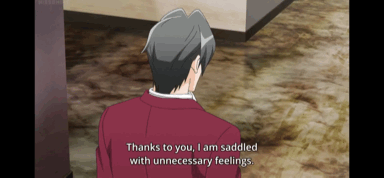
#ace attorney#miles edgeworth x phoenix wright#wrightworth#miles edgeworth#pheonix wright#phoenix wright#bad spelling#new obsession just dropped#yay#I swore this was supposed to be a short post#why must everything I post turn into a novel/essay?#please send help#it's becoming a problem#pray for me#I might be beyond saving
66 notes
·
View notes
Text
So with my James Somerton post yesterday, I expressed how miserable it all made me feel. The constant plagiarism and the weaponization of his fanbase is such a fucked up thing, especially now we know that he was covering for his own wrongdoing by harassing people who came across it. HBomberGuy seemed pretty miserable by the end; he made a pertinent point about how many people were overshadowed by Somerton's actions, and the lengths he took to steal their hard work and pass it off as his own. For a man who claimed to care so much about the erasure of queer men through history, he did a lot of fucking erasure of his own, including against gay men and their contributions to culture. It's a really fucked up and depressing thing. I don't have the heart to meme about it.
That's not me going "memeing about James Somerton is bad, think of the victims!" - that's just me describing my own perspective. I already feel like I have the weight of the world on my shoulders. I don't need to steep myself in all that right now - but anyone else can meme away.
The main concern I have after seeing that video and hearing about everything that's happened is how to rebuild. There's been a great wrong committed. How do we try to fix that and make it right? I think it was good for HBomberGuy to not only split his ad revenue proportionally between the victims of everyone's plagiarism, but to highlight other queer youtubers - some of them victims of Somerton's theft, others not. Personally, I'd like to do that too, because I really like their work and it's something I can do to try and make a tangible difference.
For my money, I want to highlight Alexander Avila, Lola Sebastian and Kat Blaque. Much like what I saw of Somerton's output, I saw them mostly through third-party apps with pop-up windows on touchscreen devices (Pi Music Player, and then NewPipe).
---
I think the first Alex Avila video I saw was "Why Can't Celebrities Queerbait?". To my recollection, it was a video that began with some recent news about a young actor who was criticized for playing a gay character in a TV show, to the point of being bullied into coming out as bisexual before he was ready. Another example was the woman who wrote the novel that "Love, Simon" was based on, which has an unfortunate overlap with James Somerton's wrongdoings.
The core of the video is about the misuse of "queerbaiting" to refer to a celebrity "appropriating" queerness, when queerbaiting is a media term for when a queer ship is dangled in front of a receptive audience only to be yanked back to keep the audience hungry for more. And Alex gives examples of this, the largest example being Teen Wolf. It's an extremely well-made video, and I thought Alex made a great point about how you really don't know a person's sexuality until they spell it out themselves. It's been a while and I might be misremembering this, so take this with a grain of salt, but I also remember a point about how bullying people out of the closet isn't the diversity win that some people think it is.
He also has an incredible video about how he was a transgender child, growing up into a transgender man. idk if this is a weird thing to say, but it's an absolute must-watch video. The video he released after that is another really good one, it's the one that HBomberGuy pointed out - it's called "TikTok Gave Me Autism: the Politics of Self-Diagnosis", and it's an incredible, poignant video that taught me a lot about the continuing stigma towards neurodivergency and the backlash against both neurodivergency and self-diagnosis through a proxy backlash towards modern social media.
Apparently, becoming a New Zealand citizen is next to impossible if you have an autism diagnosis - I had no idea. My plan was always to try and move to NZ if Australia goes to shit; given my own suspicions about my neurological state, pursuing that could end up turning all my plans to shit.
Another great video essay YouTuber is Lola Sebastian. The first video I saw of hers was a video called "The Absurd Horror of Marge Simpson". I didn't really like it, it's got a lot of like avant-garde bits, but it was good background noise for playing Runescape and it led to me finding a much bigger body of work which I really enjoyed.
She had a video called Problematic Fans which is unlisted now, it's been too long since I've seen it but I remember liking it. I've seen her video about Call Me By Your Name multiple times, it's an incredible breakdown of that movie as well as the stuff about Armie Hammer. More recently, I really enjoyed her video about Bones and All, juxtaposed by the backlash to Twilight's "softening of vampires for the sake of trite romanticism" in its heyday. It does break down Twilight, including its exploitation of the Quileute people, while also discussing a recent movie called Bones and All - a movie that's been review-bombed for, allegedly, being "Twilight but with cannibals". This video is probably the only video I've seen in years that's made me actually want to seek out and watch a movie.
I haven't seen a lot of Kat Blaque's videos lately. I did recently see her breaking down that SunnyV2 video basically shaming MrBeast's transgender friend and saying that MrBeast is gonna fail unless Chris quits the YouTube channel. What I remember the most about her is that she's got a few storytime videos about her dating life, and looking at her channel she does a lot of topical videos about media, the internet and queer issues.
I remember liking Kat Blaque's storytime videos for being personal and open, and she talks about stuff like misogynoir and her experiences as a black trans woman. This isn't a perspective I see often, not as a white Australian guy in my real life or in a broader community of video essayists. Her videos seem to be about half an hour on average, at least her more recent videos - definitely check out her videos and see if you like them, they're a good length and I think she has a lot to say. I'm just sorry I can't go into more detail.
---
My mental health is pretty bad rn. I was running on fumes yesterday and watching over four hours of video content about YouTube plagiarism and James Somerton specifically really fried my brain in a way that I really didn't need. Me saying "I can't deal with the drama behind James Somerton" and all that isn't like a Moral Stance against what's happening - I'm just at my wit's end with everything in the world right now, I don't need to immerse myself in all that right now.
But I've seen what happened, and all that is a part of me now. Probably a very unhealthy way to feel, but I've dipped my toe into it all and this is the conclusion I took away from it.
I don't want to be a part of the cancelling or the tearing down. Does James Somerton deserve backlash, to the point of losing his following? Based on what we've seen, and what I personally believe about the situation, yes. But that side of things isn't my scene. I want to help repair the damage and rebuild what's been lost in the wake of everything that's happened.
And I want to express that while James Somerton, his rampant theft and the negative effects of his actions are trending right now, I think that people who are currently focusing on tearing James Somerton down for what he did should consider joining the effort of building up a base for his victims and for other queer YouTubers - if they haven't already.
Do you have to follow Alex Avila because James Somerton ripped him off, no. Is it recompense for what happened with Somerton, probably not. But I'm recommending Alex Avila because his YouTube videos are really fucking good. I'm recommending the youtubers I recommended because I really like their videos. For any tearing down that's happening right now, I want to rebuild something more positive in its place.
I want people to watch videos like Alexander Avila's video about the politics of self-diagnosis, I want them to see Lola Sebastian's video about Bones and All. I want them to enjoy Kat Blaque's storytime content and - like myself after I finish this post - watch her most recent videos and see how they like them. If you enjoy video essay content, these three channels make really good videos, as do the other YouTubers who HBomberGuy recommended at the end of the video. I want any of my own input in this ugliness, at least past the point that I've already commented, to go towards building people up.
So consider checking out Alexander Avila, Lola Sebastian and Kat Blaque. Also consider checking out Princess Weekes, apologies for the late entry but she does some great videos about media and fandom. Their videos are a great way to fill in the time, and after the dust has settled, I hope they get a bit of a boost in attention if nothing else.
25 notes
·
View notes
Text
'A whale or a lion or an earthworm is less inclined to go off in their heads than a human. No animal other than man suffers from congenital or acquired mental disorders such as depression or multiple personalities. We may hazard an explanation for this in the extremely complex and fragile wiring of our brains. Naturally, our default mode is insanity.
There is no reason why J Robert Oppenheimer, one of the most intellectually gifted, successful, and born-rich men of the 20th century, would suffer from bouts of depression till he died—of throat cancer in 1967.
Christopher Nolan’s eponymous movie, much debated, does everything right except bring alive the man’s torment, either before or after the bomb that Oppenheimer fathered and President Truman dropped on Hiroshima and Nagasaki—killing, according to one estimate, 2,20,000 people, most of them civilians.
Truman may not have been clinically mad, but he and his country had been fighting a war that cannot be said to be the finest expression of human reason. It must rub off in ways we are not equipped to tell because we are inside the matrix.
If those melted by the bomb, even one of them, were brought back to life by Nolan and confronted Cillian Murphy’s Oppenheimer, Oppenheimer’s remorse and guilt would have had an emotional punch the movie now lacks. Because when the dead come back, they always do so with more questions than the living can ever hope to answer.
In his essay on Gunter Grass, with special reference to the post-World War II novel, Crabwalk, J M Coetzee says: ‘Grass presents his apology for not having written and, sadly, for no longer having it in his power to write the great German novel in which the multitude of Germans (italics mine) who perished in the death throes of the Third Reich are brought back to life so that they can be buried and mourned fittingly … and a new page in history can at last be turned.’
Because of Oppenheimer’s connections at the time with the Communist Party of the US, he went through a sustained period of trauma, facing allegations of sedition and leaking sensitive information to the Soviet Union. Only as late as last December was he wholly rehabilitated, and the process by which his security clearance was cancelled (by the US Atomic Energy Commission in 1954) was declared ‘flawed’.
That a man who mastered nuclear forces and invented the atomic bomb for his country could be seen as an enemy explains how one’s fate is at the mercy of the careers of other men/women. If Hitler had remained a corporal as he was in World War I, content with the Iron Crosses he earned for his bravery and his soldier’s pension, and did not cherish a career in politics ending in his becoming the Fuhrer, millions might have had their lives spared. The role of an individual’s career in the destiny of civilisation yet awaits an author.
Indeed, had Oppenheimer’s ambition and drive for power not been so aggressive, he would not have accepted the post of director at Los Alamos Laboratory, which birthed the bomb.
In the movie, one of Oppenheimer’s lovers (Jean Tatlock, a communist party member, played with disturbing neurotic indeterminacy by Florence Pugh), in the course of a bedroom scene, picks out the Bhagavad Gita from the shelf, opens it conveniently at chapter 11, and makes Oppenheimer read the lines: ‘I am become Death, the destroyer of worlds.’
The words are from Bheeshma Parva, in which Arjuna suffers from the ‘atomic’ equivalent of a nervous breakdown and would rather not take up arms against his elders and cousins; in short, he would rather not wage war. What good can come off such epic slaughter? But in the movie, the way it is played out, Oppenheimer never really has any great misgivings on his mission. They mildly assail him only after the bomb has been dropped.
The words come from one of the most egotistic chapters in all literature. Krishna annihilates the idea of Free Will for humanity. He is everything. Everything has been done. By Him. In Him, death happens. So does life. And all of it has happened once. All of it will happen again. There is no human agency. Arjuna just must carry out his dharma. In the great lines following, which Oppenheimer must have understood with keener insight than an average Indian, Krishna virtually licenses the dropping, thousands of years later, of the bomb: I have already killed Dronacharya, Bheeshma, Jayadratha, Karna, and other brave warriors. Therefore, worry not; slay them without a second thought. Do your duty, Arjuna.
Except for the appeal of Freudian association (Eros, love, and Thanatos, death, are virtually bedmates), it is not clear why coitus is interrupted for a short course on the Gita in the movie. Perhaps it augurs the destruction of Tatlot herself, who later commits suicide as Oppenheimer is reluctant to continue with the affair.
Despite the massive implication that we can all do great harm in the name of God, that if we are detached enough—having surrendered to the divine will—we are free to detonate a bomb, the nature of Oppenheimer’s career is markedly Faustian. He was ready to trade in death and make good in life. The US exploited Oppenheimer as much as Oppenheimer exploited the US. The amorality of either party does not find sufficient dramatic expression in Nolan.
Despite a boycott call by the right-wing Save Culture, Save India Foundation trending on social media, the movie has collected close to ₹100 crore at the Box Office. I suppose we have arrived at a stage in India where particle physics has become a matinee attraction. And at the same time, feel the need to save the Gita from Hollywood bedrooms. As I said, insane.'
#Oppenheimer#Bhagavad Gita#Florence Pugh#Jean Tatlock#Christopher Nolan#President Truman#Cillian Murphy
3 notes
·
View notes
Text
viii. the other one between six and nine
i must admit, i'm tired.
yesterday took a lot out of me. so much that i couldn't even give, and i ended up taking it all back. i feel ashamed of some things, and even anonymity isn't enough for the burden to be off my shoulders. the worst part is how not talking about it only ensures it will be like this indefinitely. i won't bring it up during therapy, won't bring it up with friends, won't bring it up in the tumblr posts that have no readers at all—
i'm also tired of writing. it's been almost a year since i wrote every day for a week. i mentioned the novel i started writing, right? i have notes somewhere, probably, with how often i wrote on there. fictionwriting is easier than nonfiction, though. or maybe long-form writing is easier than this. finding something new within me every day to record and share, even if every day is a different wall i'm donowalling to, is tough. i have the things i want to talk about, sure, but i am absolutely too lazy to write. i have these big projects, these long essays or even short stories i would like to put here, but i miss the so-revered otium. is neil gaiman right when he talks about writing every day? every day, every day? even writing a little bit every day is kind of hard. i haven't been worrying about word count at all, which is good, which i've never done before, but i've been worrying about more abstract measures of length. how long i can slide my phone screen to reach the end of the post, or how many paragraphs i post. the worst part is the fact that i'm not just comparing myself with myself, but with the aforementioned other blog. the other person, the other writer. i should make a post on how treacherously i compare myself to other people, ever increasing my standards, never being enough for anyone, not even me. i just wanted to say that these bigger projects will probably never leave my mind and materialise because writing every day tires me, takes time, and makes it so this is a chore, not a hobby.
(i know i have to wait until it turns into a habit, which is why i'm not stopping. i've never been a consistent writer. i've always considered it a hobby, but it's mostly been something i never do, because it's always been a chore. it's always been boring and exhausting and unsatisfying, and god, does it take a long time. i'm never good enough for myself. that's a topic for another day.)
today, i wanted to go along with yesterday a little bit, but now i don't know how i'm supposed to do that. one, because i've cut out the segments from yesterday that would segue into today; two, because i have two things that i kind of want to talk about, and i'm not really qualified to talk about either; three, because i'm tired, and bored, and sleepy, and in driver's ed. i just want my damn license. i'm not sixteen, by the way, if an american finds their way to my blog. (if anyone does.)
i wanted to talk about sex a little bit more. but just a little. i thought about going on and on about those 1970s pornos, and i do want to talk about that and how they're not porn like modern-day porn is, they're gay history and avant-garde filmmaking, but i don't want to talk about that today. in part because i've only watched one—1980's loads, by (i believe) curt mcdonnell—and in part because it pains me to talk about this. sex is hard for me. sex is everything but simple and straightforward.
that is true for several reasons. that's probably true for everyone, and everything. living is complex. but i just mean i can't guiltlessly talk about it, and not because of some prudish taboo, but because i think i have issues with sex. many issues with sex.
my libido recently has been through the roof, and i fucking hate it. i've been trying for any relief within my reach, but everything feels like a vice, like a bad habit. like i'm doing something bad to the world, even though i know most if not all that i've done is something a lot, a lot of people do. i hate this sex drive of mine. and i hate all of the truths i snipped out of yesterday's confession, and i hate all of the truths that were never in it.
i feel like a pervert. that's it. i think about sex all the fucking time, and i hate it. i don't do it in a prejudiced way, nor do i do it in an immoral way, but the sheer fact that i spend a considerable chunk of my time letting my mind drift that way makes me hate my own fucking guts. i'm not a sex or porn or masturbation addict, not by a long shot, but i think about sex—i write and read smut, i read comics and manga (hentai? fucking hentai?), i watch porn—so often, so much. i'm tired, and i don't want to be like this. isn't admission the first step to recovery? do i have to shout it from the rooftops to stop being like this?
a big part of me thinks it'll go away if i get laid. i did talk about how long it's been since i've even kissed a person. maybe, i'm just this horny because it's things that i can't have—it's just pent-up energy, just longing. all i can do is hope that's true, and hope the solution comes my way. all i can do is wait.
2022.12.28
0 notes
Text
Bitching about AoT, Part II: So, What's Good?
The summary/TLDR of this essay series is this: I think Attack on Titan is good-yet-disappointing at best, and a nihilistic mess of dog shit and poorly-executed concepts at worst. So before we get into the negative, let's discuss the positive.
What drew me to this series was this interesting spin on the post-apocalypse/zombie genre, the design of the Titans and cool military gear, and its place in a genre I like to call "Everything is messed up, everybody is complicated and we aren't usually having a good time." Think of series like Bojack Horseman, the Silent Hill franchise, Breaking Bad, and The Walking Dead as examples in contemporary Western media; for anime and manga I fit into this group, think of series like Berserk, Goodnight Punpun, Lone Wolf and Cub, Monster, and FKMT's Kaiji series. These series feature protagonists who endure a lot of trauma and hardship, and who go through a large amount of self- reflection and introspection. Most of them do some horrific things and have to come to terms with what they've done and what they may be turning into: murder, sexual assault, betraying people who trust them... these are serious heavy acts that weigh on a person's psyche.
This is something that initially made me interested in Attack on Titan. Here are just a few examples from AoT because this list would be an entire novel if it were exhaustive:
Armin uses his cunning to lie to and manipulate Bertholdt multiple times about Annie
Erwin leads his soldiers time and time again into suicide missions
Hange tortures a man for information (thank god war tribunals don't exist in this universe, or a lot of these characters would've been hanged)
the Warriors are child soldiers who betray people who thought they were comrades like Marco (whose only crime was overhearing a conversation)
Lord Reiss sacrifices his last living child first to the Survey Corps and then much more literally by trying to make her the next Founding Titan
Zeke and his followers turn countless civilians into monsters
Pyxis allows the insane sadist shoving food tubes into former ruler's buttholes a major position within the new ruling government.
Needless to say, people do messed-up things in Attack on Titan and they're not always the antagonists doing them.
What makes moments like these compelling are a) WHY the character does these things, b) HOW they react to them personally, and c) how OTHERS react to them. One common motivation behind these horrific acts in AoT is "for the greater good:
Reiss's family wants to avoid war
Zeke wants a gradual bloodless method of euthanizing his race
Gabi and Marleyans as a whole are raised to believe Eldians are devils and must bear the sins of their ancestors, so they deserve their horrific treatment and hatred.
This is a great way to show internal AND external conflict. You can have two characters that both do horrible things for what they perceive to be the right reasons and are justified, and have them oppose each other. You can have a character like Reiner slowly lose their original motivation over time and become lost in finding what all of their actions/life was worth, only to find that their old answers can't hold up after what they've seen. Please keep this key motive that's used by characters in your back pocket; if you're wondering why I haven't touched on any of Eren's actions so far, it's because this specific character motivation and Eren's actions are a MASSIVE flaw in AoT and I'm saving Eren for his own segment.
Characters new to fighting and the world's conflict kill a human being in self-defense for the first time wondering if they're irredeemable as a murderer, they sacrifice thousands of people including non-combatants and insist it's for the greater good of their goals, they try to atone for their race's perceived wrongdoings by joining another faction who wants to wipe them out and hate their heritage, they become so traumatized after years of war and loss that they give up on life entirely. It's great to have all these characters reacting differently to things they've done, and it provides for a lot of interesting character actions and individual development.
Reiner, one of my favorite characters, is a solid example of this. He goes from who he is in Season 1 as a noble soldier who can be relied on when some hectic and traumatic shit is going down to being revealed as a traitor without the audience fully knowing why. It's my favorite of the many MANY plot twists in AoT, and his character continues to develop and go down a track that makes sense; his repeated defeats, his fear at Gabi being another unwitting victim of this cycle of war and hatred, his kinship with Falco who's already doubting the perception people of Warriors and the war itself have, leading to him being a suicidal wreck that is worn down by the lifetime of war he's been raised in, just begging for an excuse to die and escape it that he almost blows his head off (and is so exhausted by everything that he sleeps through the APOCALYPSE). It's great, I love it, it's one of Iseyama's best writing moves and unlike what I'll complain about later on, it MAKES SENSE!
As far as art goes, I think that Iseyama's got some talent. I like seeing his cities, his military equipment (the design for the 3D Maneuver Gear is fantastic), and most of all I like how he draws his monsters. Non-special Titans are what got me into this series; I love how grotesque they are while also seeming...weirdly cute. Something about these giant not-quite-humans frolicking around and looking so happy and childlike while horrifically eating people just hits a specific spot in my heart, and that's just the normal Titans. The named Titans are all interesting and I love seeing Iseyama's specific brand of monster. The Colossal Titan is iconic to me and I would say it's the unofficial mascot of the series; it's on the cover of the first volume and it's the first unique Titan you see in the story. That moment where the townspeople in Maria are staring in disbelief at a Titan peering over the towering wall is so well-done.
And of course if we're discussing art and what AoT gets right, Mappa has done a fantastic job animating this series. I think a lot of people who saw the anime first might have been disappointed in the manga's art just because of how well they adapted it and improved the entire experience. Not only is the animation stellar, but the voice acting is solid and the musical score/sound design is the best I've seen from an anime (if not overall, than the best in a VERY long time). AoT's first season came out and I personally think that its quality was the main factor in anime exploding in popularity in the US after what felt like a bit of a rut. Love AoT or hate it, the anime is one of the most influential shows of the last decade in the US at least.
The premise alone was a really interesting take on a zombie apocalypse story, and the first part of the series is fantastic. You've got these giant monsters that don't seem to eat food for survival, but nobody really knows what they are or how they work. Nobody knows how these giant walls were built, and there's the constant threat of being attacked and chomped. The three different military branches are great for drawing in readers who like factions and classifications, which make for great shonen fodder; think of other examples like the ninja clans in Naruto, the Gotei 13/Arrancar/Quincy in Bleach, the Warlords/Emperors/pirate crews in One Piece, the power levels in Dragonball, the different classifications of Stands and Pokémon in Jojo and Pokémon respectively. You also have cool transformations with the Titan shifters, who are basically pilots of giant mechas made of flesh (and mechas also make for great shonen fodder).
Not only that, but the intrigue and mystery surrounding Eren's dad are a FANTASTIC overall goal for Eren and the gang to try and solve. You're left with all sorts of questions and just enough threads to let you weave all sorts of theories as to what it could all mean. The same thing can be said of what Titans are, where they came from, why they act the way they do, and what the world outside the walls is really like are also great mysteries that readers can enjoy theorizing and wondering about with the crumbs of information they're given. Unfortunately, it seems it's a little TOO good; with how the mysteries ramped up as the group finally makes it to the basement, whatever wound up in there had to be something amazing and worth literal years of hyping it up. And no matter what it wound up being, I don't think it ever COULD have lived up to the hype. I think the basement reveal being so underwhelming and the drop in readership shortly afterwards was one of the first signs that the quality of AoT was beginning to nosedive.
As far as plot twists go, I think that Annie being the traitor is the best one in the series. It's genuinely surprising, it makes sense as to how the group figures it out, it leads to an awesome fight inside the walls with Eren and Annie for a climax to the arc, it provides great conflict for Eren as he realizes he was betrayed by someone he trusted dearly, it adds on another mystery and cliffhanger when Annie crystallizes herself, and the twist doesn't come completely out of nowhere. In my opinion, a good twist CAN be predicted early on by observant viewers; even before Armin explains all the ways he was tipped off that Annie was the Female Titan, the reader/viewer had the same chance to see those warning signs themselves. Like I said earlier, I like it when Iseyama writes things that MAKE SENSE! Don't expect much of that as the series goes on, lol.
As for characters, I've already established my fondness for Reiner. But I think my favorite character would have to be Sasha. She's the one real comic character in a gritty, nihilistic, ultra-violent world and her personality just works so well against the other main characters. Not only that but her character development is great; she goes from a bumpkin forest-dweller who refuses to let the outside world ruin her family's home to someone who realizes the world is connected, and that wants to save her ENTIRE home--the forest, the town, the neighboring provinces, and all of Paradis from the Titan menace. She's also a character who is rightfully scared shitless of Titans for a long time after first encountering them, and part of her development comes from how she leans to face that fear. She goes from cowering and praying she doesn't see a Titan to taking one out on her own with an axe, a bow, and finally just hurling an arrow right into its eye while escaping by the skin of her teeth.
She's also an important member of the team and can hold her weight in a fight, as she's the squad's go-to sniper. Considering how anti-Titan combat is heavily reliant on close-quarters, it's nice to have a talented long-range fighter to keep things interesting; that way, you can have some variation with your fight scenes so it isnt just Eren punching Titans and Mikasa and Levi hacking and slashing all the time. I also loved her spotlight episode in the anime early on as a self-contained story AND how it leads to the little girl she saved being brought back much later on. It's one of my favorite episodes of the entire series!
My third favorite character is Erwin. I love characters that push on and do what has to be done despite getting blood on their hands, and Commander Erwin Smith is drenched in red. Every decision he makes leads to people dying, whether it be civilians or his own soldiers, and he seems to acknowledge that early on. I really appreciate the scene where he just tells the MP leader that once the Female Titan threat is dealt with, he's more than happy with being put in prison, put on trial, and executed for war crimes or treason; in fact, here's the name of my second-in-command and the people in charge of various operations I'm heading so that YOU can decide what to do if you take me out. You don't want that responsibility? Then let me keep it, because I'm willing to take the burden that comes with this position.
While he does have a secret and more selfish motive for leading the Survey Corps, I think it makes him more human that way. Commander Erwin is the ideal every soldier wants to live up to, fighting the Titans solely for the good of humanity. But Erwin the person just wants to know the truth behind the world, and he'll fight to the bitter end in order to find out. That's a reason that makes sense even before learning about his backstory regarding his father, as learning the secret/forbidden truth of things is something people in the real world do--and much like in the real world, Erwin dies without ever learning the answer to it all.
And he's just COOL. He's so dedicated that he uses a horde of Titans as a strategic weapon, rallies his men to battle and follow this insanely dangerous plan, charges into battle like a knight of old, and manages to survive getting his arm chomped off while STILL yelling for his men to keep moving forward. That isn't even covering him leading the new recruits at Wall Maria to what they know will be their deaths, just so Levi has a chance at defeating the Beast Titan. And he manages to inspire them/convince them to do it, screaming not just to cover Levi's presence but to show their humanity through their fear and defiance as they die. What a badass.
And with that, I've covered everything I like about AoT. Now let's start bitching.
15 notes
·
View notes
Text
SONGS OF RESISTANCE: The View Myla Grants Us Of Hallownest’s Moths
hello again hollow knight fandom, i am back with my picante takes and ready to discuss two things i love: myla hollowknight and the moth tribe! Let Us Be Sad About Them Together.
as with my previous essay i’m going to be putting this fellow up on dreamwidth later for accessibility purposes since my layout text may be too small for high-res pc users. this time i’ll be attaching that in a reblog to avoid this post getting eaten by the dread tungle algorithms.
CONTENT WARNINGS FOR TONIGHT’S PROGRAM: This essay discusses colonialism and genocide both in real life and the fictional depictions in Hollow Knight, as well as racism in the zombie horror genre and in fandom.
ALSO: if youre from a christian cultural upbringing (whether currently practicing, agnostic/secular, or atheist now), understand that some of what i’m discussing here may challenge you. if thinking thru the implications of this particular part of hollow knight worldbuilding/lore is distressing for you, PLEASE only approach this essay when youre in a safe mindset & open to listening, and ask the help of a therapist or anti-racism teacher/mentor to help you process your thoughts & feelings. just like keep in mind that youre listening to an ethnoreligiously marginalized person and please be respectful here or wherever else youre discussing this dang essay
SONGS OF RESISTANCE: THE VIEW MYLA GRANTS US OF HALLOWNEST’S MOTHS
In this house we are all love Myla.
Well, in all fairness, there are probably plenty of Hollow Knight fans who aren’t interested in her character, since which fictional characters one attaches to is always a matter of personal preference. But she’s still well-loved for a minor NPC and inspires a high level of devotion in her fans. There’s nothing that whips folks into a frenzy like a cute character you can’t do anything to help, and unlike some other characters in Hollow Knight Myla’s fate leaves no room for ambiguity. Once you pick up the Crystal Heart you’re left with only two choices: Avoid her, or kill her.
A lot of Hollow Knight’s world is designed to make you care about it so that it will hurt more when Ghost’s violent skillset proves too limited to save something or someone. The consequences of Hallownest’s founding and policies have directly or indirectly caused a great deal of damage to everything, and chief among those consequences with massive damage and a wide splash range is the Infection. Much has been said elsewhere by other people about Hollow Knight’s predominating mood being a struggle against futility, with Ghost arriving at the eleventh hour and every new tragedy designed to make the player more desperate to find something actionable, only finding out by trial and error what’s beyond your personal ability to save.
Myla, in that sense, is a typical example of that worldbuilding. She’s a particular kind of stock character in the zombie horror genre, the innocent who falls victim to the plague and cannot be saved, wrenching audience hearts and demonstrating the stakes.
But Hollow Knight plays with the trappings of zombie horror in a very unusual way, one I find thematically fascinating.
For a quick overview, the “zombie” as we know it in popular culture is an appropriation of a voudou (the Black American spiritual practice) concept that deals with the fear of slavery killing one’s spirit. (People more versed in/with roots in voudou culture can give a much more comprehensive overview than this simplistic one.)
The zombie horror genre, especially in Western media, is part of the great white fragility stock plot trifecta (the other two being alien invasions and robot uprisings). Zombie horror in particular expresses white fears that marginalized ethnic groups will rise up violently in revenge for their mistreatment and destroy white society. The fear of “that which is human, which ‘humanity’ is not” (to borrow mecha visual novel Heaven Will Be Mine’s pithy term) and the extreme levels of violence towards human-but-not bodies typical of zombie horror are often an expression of such bigotries. This is, again, a subject that’s been discussed in greater depth and with more nuance elsewhere.
But what Hollow Knight does is take the ugly metaphors and it makes them literal, makes it harder to ignore the toxic subtext of the genre. The Infection is literally a native god’s revenge on the settlers who committed genocide* against her people. How the Pale King’s colonization of the crater negatively affected the preexisting groups of bugs underpins every level of the worldbuilding, as does Hallownest’s cruelty towards its neighbors.
Hollow Knight is a game that is about the tragedy of Western imperialism. It is one of the work’s central themes. There are a lot of conversations that need to be had about the ways these themes manifest and, on a real-world level, about fandom’s predisposition to avoid the subject.
But, for now, let’s get back to Myla. If she fits such a stock zombie horror archetype, and Hollow Knight uses zombie horror tropes to underline the conversation it attempts to have about colonialism, then what has Myla got to teach us about the overall worldbuilding?
There's two topics I’d like to broach here: First we’ll get into how the circumstances of Myla’s infection fit in to the implied role of Crystal Peak in pre-Hallownest society. Then let’s take a long look at the lyrics of Myla’s song and what it implies.
MYLA, THE CRYSTALS, AND THE HOLY MOUNTAIN
If you think about it, Myla is an interesting outlier compared to the other NPCs we encounter on the verge of succumbing to the Infection. Both Bretta and Sly are unhappy: Bretta is a lonely, anxious bundle of abandonment issues yearning for someone to sweep her off her feet; Sly misses his pupils and loved ones who’ve left him in death (we never learn who Esmy is or what they were to Sly, but we sure can tell they’re not around anymore). The temptation to dream away those sadnesses seems to play a part in their vulnerability to the Infection, and also why Ghost’s interruption brings them back to reality.
Not so Myla. She appears to be blissfully unaware of her fellow miners’ fate, and most of her dialogue prior to her infection (besides the song - we’ll get to that later) is about how much fun she’s having at her job and how much she enjoys Ghost’s occasional company.
Yet she still winds up infected when Ghost’s back is turned. Why?
Not to discard the possibility that Myla’s got her own issues too, but in her case there seems to be another likely cause at hand: The crystals. If hit with the Dream Nail before infected, she mentions that she can hear them “singing” and “whispering”.
Under the The Hunter’s Hot Takes section of the Hunter’s Journal entries on various Crystal Peak enemies, we can learn more about the crystals - particularly in the entries for the Husk Miner and Crystallized Husk.
Crystal Peak’s crystals were thought of as particularly precious in Hallownest and harvested en masse for use in luxury items and the like. To do so, the mining operation was set up throughout most of the mountain, though the area around its peak still remains largely untouched. However, there’s more to the crystals than just that. Like Myla, the Hunter notes that the crystals can be heard to sing very very softly if one listens closely enough.
Perhaps of even more interest than that is this particular comment he gives us, from the Crystallized Husk journal entry: “There is some strange power hidden in the crystals that grow up there in the peaks. They gleam and glow in the darkness, a bright point of searing heat in each one.”
I don’t think it’s a particularly revolutionary idea to point out that there’s some connection between the crystals and Radiance’s power; this is something many players have intuited just based on Myla’s dialogue. But, in order to understand what Myla is demonstrating about the game’s world I think it’s important to think about what that connection is.
Speaking of which, the local Whispering Root has two important clues for us: The phrases “light refracted” and “energy contained”.
The very top of Crystal Peak is one of the only places in the crater where the moths’ architecture has escaped Hallownest destroying it, and is the only place in the entire game setting where their religious iconography remains fully intact. There are stone monuments covered in their language (which has been destroyed with the rest of their culture) and the statue of the Radiance - this is easier to see in the Wanderer’s Journal tie-in book, but the huge stone arches upon the Crown represent Radi’s halo and its rays and encircle her when viewed head-on or from a distance instead of the side view we get in the game.
The crystals grown here were used by the moths to store and cultivate Radiance’s light. It’s impossible to know what sort of architecture/infrastructure existed inside the mountain before Hallownest stole it from the moths. But between the massive scope of her statue and all the texts at the Crown, and the fact that the moths were working with their literal actual god’s freely given power here, it can be safely asserted that Crystal Peak was a holy ground to them.
Hallownest didn’t care about the mind-boggling level of spiritual significance Crystal Peak must have had to the natives, though. To the Pale King and his people, the crystals are just a natural resource to be harvested for personal profit.
This is unfortunately a conflict that still plays out in colonized countries today. If you’re American, #NoDAPL probably comes to mind; Canada, Australia, and New Zealand are filled with these sorts of horror stories too. Settler disrespect for indigenous sacred grounds is a huge problem that needs addressing. If you’re looking at the story of Crystal Peak and thinking it’s very on-the-nose... maybe it needs to be.
Anyway, Myla is nowhere near as miserable as Bretta or Sly, but she still notices that something’s up with these crystals. She hears the voice coming from inside, and she’s curious, and she tries very very hard to listen to it... so she DOES end up hearing Radiance’s voice. Radiance’s real voice, not the songs and whispers inside the crystals: The voice of a frightened, angry, grieving god who knows there’s a new vessel running around in Hallownest, and doesn’t want any part of that. A voice that’s pleading for someone, anyone to kill this dangerous creature, and save her from the threat Ghost poses.
Between how freaked out Radi is to know Ghost is poking around, the tendency we see in her boss battles for her to panic and kneejerk blast things at full volume/vibrance when she’s panicking, and the way her dream broadcast seems to be only a one-way communication line while she’s in the Black Egg... naturally this spells disaster for poor Myla.
Similar to the Moss Prophet, this small tragedy is a demonstration of the eleventh-hour state the conflict is in: The Pale King has escalated this situation so far, and Radiance is so traumatized and isolated, that bystanders who might in a kinder timeline have become Radi’s allies instead get caught up in her AOE. Myla’s definitely not as aware of the overall situation as the Moss Prophet, since she’s a Hallownest bug and not an indigenous one the way they are. But she noticed things were not as they seemed, and she was curious. Who knows what new possibilities could have opened up, if Radiance was able to truly communicate with bugs in the outside world?
Small side note before we move on, but I’ve noticed a tendency among some folks who notice the missed connections to come down extra hard on Radiance and chalk Myla’s infection/Moss Prophet’s death down to deliberate cruelty on her part. I’d like to gently push back against this.
Living in a post-colonial world we all absorb some level of prejudice from our surroundings, and it’s important to take a look at our first assumptions about people (or, in this case, fictional characters lol) to examine whether these prejudices we’ve inherited have influenced those assumptions.
So, if your first instinct is to look at this situation and say the problem is that Radiance is being too harsh and too angry where she should have stepped back and softened her emotions for others’ benefit to gently persuade them to her side... Please think about how when people of color and non-Christians express anger or hurt at our treatment, or even so much as calmly assert our boundaries, white/Christian viewers often view us as much more aggressive and threatening than we actually are. The “angry black woman” trope is a good example of this stereotype. You may want to look up the HuffPost article “Why It’s So Hard to Talk to White People About Racism” and its discussion of white fragility to further understand this phenomenon.
It is absolutely essential to remember the complex power dynamics in play in Hollow Knight and that the Pale King deliberately imprisoned Radiance (who had at this point already gone through an extreme amount of trauma) in a way that would compromise her ability to communicate with others. If you can extend compassion to characters like Ghost or the Pale King and empathize with their motives/feelings when their actions cause harm, but you are not willing to do the same with Radiance... it’s important to sit down with yourself and examine why that is.
THE MEANING BEHIND MYLA’S SONG
Okay, let’s switch gears and take a look at the lyrics to the song Myla sings, since it’s got some interesting things to tell us too.
The first verse, which you can hear from Myla the first time you meet her/before you acquire Vengeful Spirit, goes:
Bury my mother, pale and slight
Bury my father with his eyes shut tight
Bury my sisters, two by two,
And then when you’re done, let's bury me too
There’s not much particularly story-related going on here except foreshadowing that Myla may in fact wind up dying. Most of what we get here is that a) this is a song about burying the dead and b) it’s morbid as fuck.
Curious, a new player might think of the mention of burying the dead; there are a lot of corpses just lyin’ around all over the ground - something that might lead one to believe Hallownest didn’t have such a custom. Later players will discover the Resting Grounds, confirming Hallownest did bury its dead... and that the gravekeepers are all dead too.
Let’s look at the second verse, which Myla remembers and will sing after you pick up Vengeful Spirit:
Bury the knight with her broken nail,
Bury the lady, lovely and pale
Bury the priest in his tattered gown,
Then bury the beggar with his shining crown
This right here is where it gets interesting. The first verse describes the singer’s family as dead or dying, but the people we’re burying now sure do have some parallels to Hallownest's ruling body, don’t they?
Among Hallownest’s Great Knights, three of them - Dryya, Isma, and Ze’mer - were women. They are also very dead or might as well be: Dryya was killed by Traitor Lord’s resistance, Isma is a tree spreading acid through the kingdom’s waters to cut off access to the City of Tears, and Ze’mer hung up her nail after her mantis girlfriend’s death and only lingers on as a revenant.
While there aren’t any characters who are described in-text as “priests” in Hallownest, the idea of a tattered gown might bring Lurien the Watcher to mind, or perhaps the Soul Sanctum’s magicians before they went rogue.
The lovely, pale lady in the song can only refer to the White Lady, Hallownest’s queen. And there’s only one man in the game who has a shining crown: The Pale King. The lyrics are particularly derisive towards him in a way they aren’t to any of the other figures listed, too.
So, it seems like whoever came up with this song didn’t think much of Hallownest. With that in mind it’s hard to think that it originated from any sort of faction loyal to the king.
We’re missing a line from the third verse, which Myla sings after you’ve beaten Soul Master and she’s beginning to become infected. But what we do see of it is Huge in terms of lore:
Bury my body and cover my shell,
[...]
What meaning in darkness? Yet here I remain
I’ll wait here forever ‘til light blooms again
So. The “protagonist” of this song’s family has died, and they expect to die as well, but even unto death they're waiting for Hallownest to fall and the light to return.
The moths became Hallownest’s gravekeepers after the Pale King forcibly assimilated them. Under the Pale King’s light, the moths forgot Radiance and most of their original culture, but Seer tells us in her final monologue that a few individuals remembered just enough to pass bits and pieces down through the generations. This secret resistance among the moths was what kept Radiance alive and prevented her from being sealed away entirely.
This song Myla sings comes from that moth resistance.
Code songs amongst oppressed ethnic groups are very much a real thing, especially when groups have to communicate or signal each other within hostile parties’ hearing. Since I’m American (and had a big ol crush on Harriet Tubman as a little kid lmao!) the first thing that came to mind for me when I made this connection was the working songs escaped Black slaves used in the Underground Railroad.
These have another point in common with the moth gravedigger song Myla sings, in that they enter the general cultural consciousness through out-group people who don’t know the true context. If you ever pick up a book of American baby songs, you’ll probably find some Underground Railroad code songs in there - often because generations ago white kids heard these songs from Black slaves or servants, and went on to sing the same songs to their children with zero awareness of what the songs were really for.
So some Hallownest bug somewhere probably heard the moths’ song and liked it and sang it in a context totally divorced from its original one, and it got spread around and passed down to become one of Myla’s old favorites, with her seemingly not realizing the meaning behind the lyrics. The moths’ song of devotion to their lost god survived them as a people.
This is some VERY realistic and layered worldbuilding. There is so much to glean from just one NPC’s dialogue when put together with other clues. Of course all of it is SAD and DEPRESSING, but Hollow Knight is a tragedy with a super unsubtle point to make about the unsustainability of Western imperialism.
What happens to Myla is awful, and upsetting, and unfair. So was what happened to the moths and their sacred ground, and to Radiance too. It’s important to understand the scope of the conflict that led to all this happening, trace it to its roots, and lay it at the feet of the ones responsible for engendering all this tragedy in the first place: Hallownest and the Pale King.
*A NOTE ABOUT MY USE OF THE TERM “GENOCIDE”
This is a tangent, but since there’s some debate about whether it’s appropriate to define the Pale King’s actions towards indigenous bug nations as genocide, allow me to cite the official definition of genocide here.
The Convention on the Prevention and Punishment of the Crime of Genocide (the Genocide Convention for short) defines genocide like this:
Genocide is any of the following acts committed with intent to destroy, in whole or in part, a national, ethnical, religious, or racial group, as such:
A) Killing members of the group
B) Causing serious bodily or mental harm to members of the group
C) Deliberately inflicting on the group conditions of life calculated to bring about its physical destruction in whole or in part
D) Imposing measures intended to prevent births within the group
E) Forcibly transferring children of the group to another group
Among the abovelisted, Hallownest is guilty of A (Deepnest and the moths), B (Deepnest physically/the moths vis a vis brainwashing), C (the mantis tribe and the hive), and E (the moths, which we know from Marmu, and possibly the mosskin also - Isma is mosskin).
Then there is cultural genocide, i.e. acts committed with intent to destroy, in whole or in part, a national, ethnical, religious, or racial group's way of life. Let’s look at the United Nations Declaration on the Rights of Indigenous Peoples (DRIP) and how it defines cultural genocide:
A) Any action which has the aim or effect of depriving them of their integrity as distinct peoples, or of their cultural values or ethnic identities
B) Any action which has the aim or effect of dispossessing them of their lands, territories or resources
C) Any form of population transfer which has the aim or effect of violating or undermining any of their rights
D) Any form of assimilation or integration by other cultures or ways of life imposed on them by legislative, administrative or other measures
E) Any form of propaganda directed against them
Hallownest is guilty of every item on this list. A: The moths, attempted with Deepnest. B: The moths, the mantises, the flukes, the mosskin; also attempted with Deepnest. C: The moths, the mantises, the flukes. D: The moths; attempted with the mantises and Deepnest. E: The mantises and Deepnest.
Any sort of discussion of the wide-reaching harm Radiance caused MUST include the context that the Infection is her response to multiple levels of genocide. Discussion that does not include this context loses nuance and simplifies the conflict and power dynamics portrayed in the game in ways that reflect real-life racism and Christian supersessionism.
Now, this is NOT some sort of holier than thou Fandom Purity dunk to say that it’s Bad or Wrong to care about Hallownest’s nobility. Like, one of my favorite characters in this dang game is the White Lady, who spent a long ass time enabling her husband’s actions before she finally walked out on him over the mass infanticide thing. You can, and it is okay to, love TPK and want rehabilitation for him while acknowledging that the dude has done objectively bad things.
I just feel that it’s important to keep things in perspective so that we don’t wind up stirring a bunch of real-world bigotry into our fandom funtimes. A lot of us don’t have the luxury of turning our brains off and simply Not Seeing It, because these same sorts of dynamics are behind a lot of the hardships that threaten our everyday stability.
It’s pretty hard to have conversations about those things in real life if one can’t even recognize them in fiction. So, this might be a good opportunity to start practicing anti-racism so we can better utilize that ideology in real life, where the stakes are much higher.
#hollow knight#hollow knight spoilers#hollow knight meta#myla hollow knight#the radiance#hk myla#hk radiance#essay#long post under cut -
292 notes
·
View notes
Photo

As a generalist-dilettante, I somewhat agree, though being a generalist (as opposed to a specialist) doesn’t require having what Girard has, which is one totalizing theory. I just can’t quite get as Girard-pilled as everyone else now seems to be, though I tried. Maybe it’s because everybody’s (apparently) converting to Catholicism these days, whereas I was raised that way and don’t find the basic concept all that novel. His big idea seems half a truism and half a wild exaggeration to me. As Elif Batuman, reflecting on grad school at Girard central, wrote in The Possessed:
Furthermore, the entire Girardian enterprise began to strike me as hypocritical. If Girard was right about the human condition, the only appropriate course of action was to stop what we were doing, all of us, right now. If novels were really about what he said they were about, then their production should cease. All we really needed was one novel, and we would all read it and realize, like St. Augustine, that the basic premises of literary narrative—love and ambition—could bring only misery. Renouncing our desires, we would give ourselves up to spiritual contemplation.
But Girard is an authentic hedgehog in Berlin’s sense:
The title is a reference to a fragment attributed to the Ancient Greek poet Archilochus: πόλλ' οἶδ' ἀλώπηξ, ἀλλ' ἐχῖνος ἓν μέγα (“a fox knows many things, but a hedgehog knows one big thing”). In Erasmus’s Adagia from 1500, the expression is recorded as Multa novit vulpes, verum echinus unum magnum. (The fable of The Fox and the Cat embodies the same idea.)
Berlin expands upon this idea to divide writers and thinkers into two categories: hedgehogs, who view the world through the lens of a single defining idea (examples given include Plato, Lucretius, Dante Alighieri, Blaise Pascal, Georg Wilhelm Friedrich Hegel, Fyodor Dostoyevsky, Friedrich Nietzsche, Henrik Ibsen, Marcel Proust and Fernand Braudel), and foxes, who draw on a wide variety of experiences and for whom the world cannot be boiled down to a single idea (examples given include Herodotus, Aristotle, Desiderius Erasmus, William Shakespeare, Michel de Montaigne, Molière, Johann Wolfgang Goethe, Aleksandr Pushkin, Honoré de Balzac, James Joyce and Philip Warren Anderson).
Turning to Leo Tolstoy, Berlin contends that at first glance, Tolstoy escapes definition into one of the two groups. He postulates that while Tolstoy's talents are those of a fox, his beliefs are that one ought to be a hedgehog and so Tolstoy's own voluminous assessments of his own work are misleading.
This is a fun parlor game, as Berlin intended, and any given figure will be closer either to the hedgehog or fox ends of the spectrum, but almost every major writer, artist, and thinker can, it seems to me, be evaluated as Berlin evaluates Tolstoy.
Greatness may even be nothing more or less than the ability to transcend, to synthesize, this polarity. Shakespeare’s panoply of characters and metaphors, Joyce’s endless dispersion of styles—do they not gather into an emergent world and worldview so that everyone knows what you mean when you say “Shakespearean” or “Joycean”? And similarly, aren’t Dante’s and Hegel’s total visions as powerful as they are precisely because they allow those visionaries to find a place for everything, all the variety, in the universe? To be great, the fox must become half a hedgehog, the hedgehog half a fox. Spenser—a fox who thought he was a hedgehog if ever there was one—wrote of “eterne in mutabilitie.”
But then I haven’t read Berlin’s essay since I read War and Peace itself, almost two decades ago. I know I should revisit War and Peace, but there’s always another book of 1000 or more pages to read for the first time. I’m reading The Faerie Queene now, if you couldn’t tell. That’s why I haven’t updated my main site in a month. Expect some Spenser-posting by the weekend there, though.
In postscript: I have never found a satisfactory explanation of the fox-hedgehog metaphor’s literal level. In what sense does a real-life fox know many little things, while a real-life hedgehog knows one big thing? Aesop’s fable doesn’t clarify the question. Is it because the proverbially sly fox has many feints and tactics while the hedgehog has just the one defense? But this doesn’t account for little vs. big knowledge, nor would I say it pertains to knowledge per se at all. Please feel free to send an answer!
12 notes
·
View notes
Text
7. My Top 15 Anime List
I have watched a lot of anime in the past four years, but one thing that gives me great enjoyment is ranking my top anime. Here I will rank my top 15 favorite anime, along with some honorable mentions that couldn’t make it. However, I won’t be going too in-depth on the analyses; I just want to give you a general idea of why the particular anime is where it is on my list. In general, I rank my anime depending on a combination of factors: 1) how brilliant I find the anime to be written, 2) if the themes resonate with me, 3) if it is categorized in my favorite genres, and 4) my general enjoyment level. Anyway, to the list.
Number 15
One Punch Man

When I first watched One Punch Man, it seemed nothing more than a mindless comedy anime. Don’t get me wrong, I really enjoyed it and laughed a lot, but I found it to be forgettable. But one day, I heard that the genre of One Punch Man was seinen, which made no sense to me. It had no dark and mature themes, and as I mentioned, it was nothing more than a senseless comedy. But then one day, on a whim, I watched One Punch Man again. And I REALLY enjoyed it. I still laughed a lot, but something felt different to me this time. I actually felt like I had a deep connection with each of the characters. The story seemed to be more structured and enjoyable this time, and finally, I could actually see the themes that One Punch Man was trying to explore. It made sudden sense to me that One Punch Man is indeed a seinen and that it had a lot more to it than on the surface. Of course, the difference in experience is because of my new understanding of anime and the experience I gained.

Number 14
Kenichi: The Mightiest Disciple
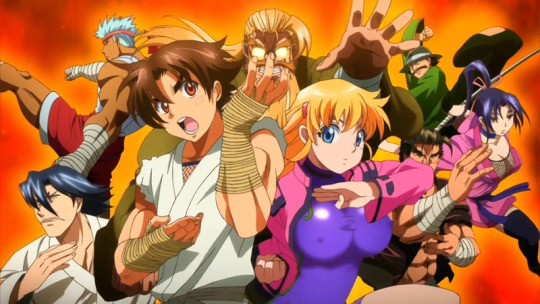
Kenichi: The Mightiest Disciple is probably one of the most unknown, underappreciated, and underrated anime on this list. Someone recommended it to me, and I had never heard of it, so I assumed it was a mediocre anime. But when I watched it, I had so much fun which I hadn’t felt in many months. It is a training shōnen anime where the main character tries to learn martial arts. That is all I want to say for now because I don’t want to spoil anything, so go watch it. I highly recommend it.
Number 13
A Place Further than the Universe
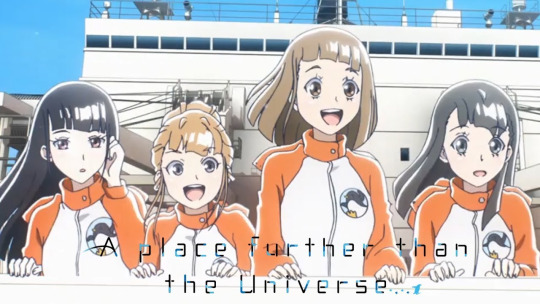
I don’t see many people talking much about A Place Further than the Universe. But, I must say, it is absolutely phenomenal. It is, hands down, the most inspiring anime in existence. The basic premise is a high school girl wanting to do something significant in her high school life. I won’t say anymore because, again, I don’t want to spoil this anime, and I recommend you check it out if you need inspiration in your life. Let me just say that it is now an aspiring goal of mine to visit Antarctica.
Number 12
Plastic Memories
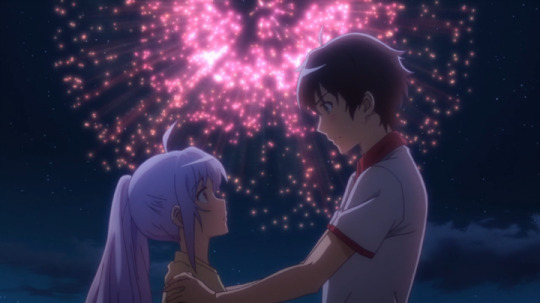
I made a whole analysis on the previous post so go check it out. But for a quick recap, the life lesson I learned from Plastic Memories has permanently changed my behavior for the better. I found it to be the saddest anime I have ever watched.
Number 11
Steins; Gate

Once again, I have already made an analysis on Steins; Gate, but this time I only covered the first episode. I also ranked Steins; Gate a 10/10 so that must mean that the rest of this list must contain masterpieces. But to be honest, that is not really the case. You see, to me, even if I consider something a masterpiece, the enjoyment factor plays the most significant role in ranking high on my list. For example, I found Death Note to be brilliant, but I really struggled to enjoy it and therefore, it is not ranked that highly. Don’t get me wrong, I really enjoyed Steins; Gate, but I just enjoyed the rest of these anime way more. Anyway, if you want to see why I loved Steins; Gate so much and why I find it so brilliant, check out blog post 4.
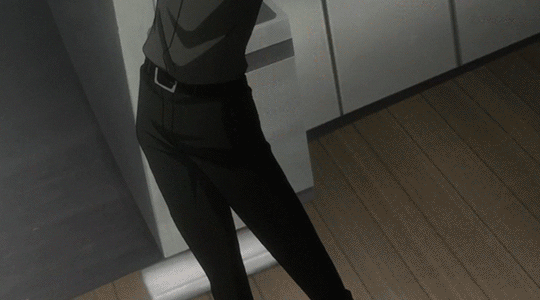
Number 10
Berserk (Manga)
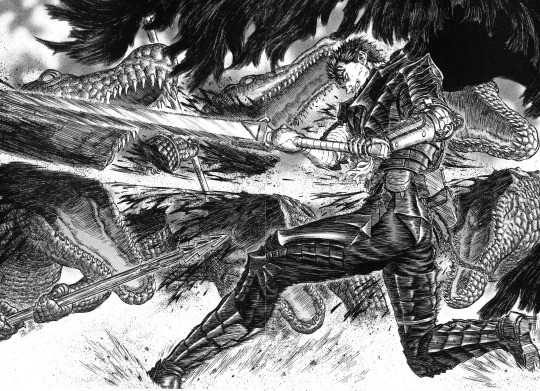
Almost everything I found In Berserk is brilliant (except its adaptations, that’s gas station toilet). Guts is a 10/10 protagonist, Griffith is a 10/10 antagonist, the cast is a 10/10, the story is a 10/10, AND THE ART!!! Holy shit!!! I can actually picture an entire museum dedicated to each panel of Berserk.

Again, the only reason this anime is not any higher is simply because I enjoyed the others on this list so much more. However, I am yet to review any analyses on it so there is a possibility that it will bump-up several places higher when I truly understand the brilliance behind it. Great read though!
Number 9
Haikyuu
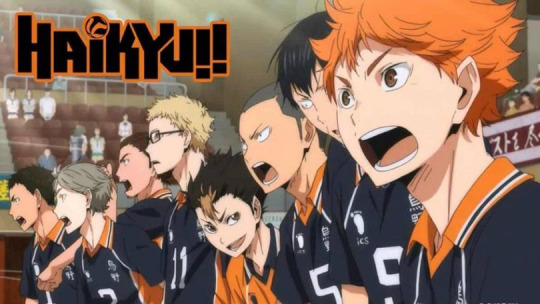
I LOVE Haikyuu. Each season gets progressively better and better. It has a lot of controversy around it because of its fan base and because it’s a sports anime. But to be honest, I find Haikyuu to be a better shōnen than My Hero Academia, Black Clover, Jujutsu Kaisen, Demon Slayer, and most other modern shōnen anime. It has its amazing moments, its cast is amazing, the character development is amazing, the themes are amazing, and the antagonists are amazing. I am not bluffing when I say that the antagonists in a Volleyball anime are better than the antagonists in many shōnen anime (I’m going to develop haters before I can even develop fans). I plan on making an essay on what most shōnen strive for yet fail to achieve, and Haikyuu somehow delivers.
Number 8
Oregairu

Best romance. Hands down. Oregairu, or SNAFU, or My Teen Rom-Com is Not What I Expected (yes, so many titles) is a masterpiece in its own right. If you are a guy and you watched Oregairu, don’t act like you didn’t imitate Hachiman a couple times. He is a beautiful protagonist, which most of us guys relate to. His inner monologues result in us treating them as gospel. The sub-text is confusing as fuck, but end up making sense in all sorts of ways once decoded. Yukino is best girl, but man I love Yuigahama almost just as much. The general enjoyment I got out of Oregairu is so far through the roof that I once forced myself to stop watching it so that I could savor the show a little more. It is a little difficult to get into at first, but you will most likely end up enjoying it.
Number 7
Re Zero

This is the most recent addition to the list. I often don’t add anything new to my list; I just switch the places between some of them. But ever since season 2, Re Zero jumped significantly in rank. It is the best anime of 2020 (including sequels), and I enjoyed each episode to the max. I was considering adding Re Zero to my top 10 since the first half of the second season finished, but I was a bit hesitant because I am easily affected by recency bias. But my love for Re Zero would just not die down: my love for it grows after each episode airs. It is the only anime on this list that I watched weekly other than One Piece. I actually prefer watching a series I love weekly rather than binging it all, except for One Piece, pacing is constipation (slow and painful). Other than the vast enjoyment I got out of Re Zero, the main reason it made it to this list is because of the light novel comparisons I watch. Aninews is my favorite source. He compares the episode to the light novels, mentioning what was left out and further describing the emotions and thoughts of the characters. He tends to release the “Cut Content” videos a week after the episode airs, but the content and quality are incomparable. I found the videos to be so amazing I am basically just as excited for the weekly videos as the Re Zero episodes themselves. If you love Re Zero, the Cut Content series is a must watch.
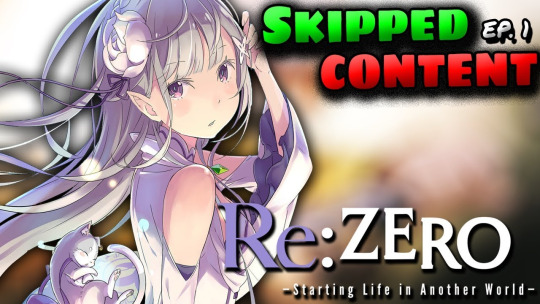
The fantastic details and emotions the light novels are able to portray are stunning. I decided to read the light novels recently, but the only issue is that I am very short on time. But for each novel I complete, I will release a post on it.
Number 6
Mob Psycho
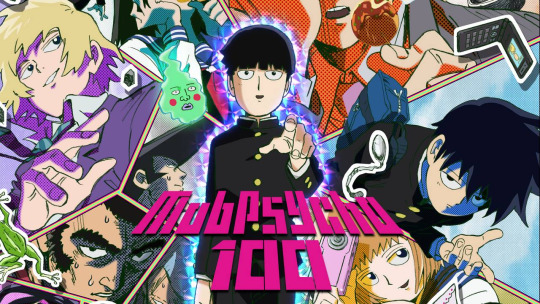
Although I said I found Haikyuu to be better than most modern shōnen, Mob Psycho is hands down the king. Its quality far surpasses all modern shōnen and a lot of older generation shōnen too. Funny thing is, I believe Mob Psycho’s primary genre is slice of life, not shōnen. I also believe it to be the best take on an overpowered protagonist. One of my favorite things is that Mob, who is the strongest esper we have seen, seems to be so weak. That is exactly how he should be portrayed; he is still a child with mental challenges that he is constantly trying to overcome. The themes that Mob Psycho explores are some of my favorites. The animation is a bit weird at first, but after watching it, you suddenly realize how brilliant it is.
(Honorable Mentions)
Attack on Titan
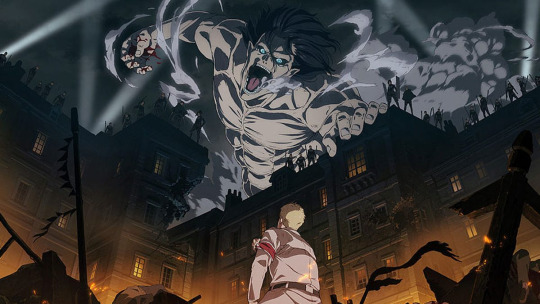
I am going to get a lot of hate for not including this in my top 5, let alone my top 15. Attack on Titan is still releasing episodes, so that opinion may change soon but let me be clear about one thing: Attack on Titan is a masterpiece. It is absolute greatness. The hype and enjoyment I get out of Attack on Titan are out of this world. But, a) the enjoyment feels a bit short-lived for me personally. It is a fantastic week after airing, but I tend to forget about it the next. b) Attack on Titan is simply not my type of show. Again, I do love Attack on Titan. Again, it is a masterpiece. And again, it may bump up a bit after a few episodes release, but as of now, Attack on Titan isn’t in my top 15.
(Honorable Mentions)
No Game No Life

Similar to One Punch Man, I thought No Game No Life was an anime for senseless fun and enjoyment. But then I watched the movie. The movie is canon to the light novels, but it is irrelevant to the plot and only contributes to the understanding of the world. However, since I watched that movie, I felt the world of No Game No Life to be more realistic. Of course, a world where games resolve all sorts of conflicts like war is ridiculous. But after watching the movie, that ridiculousness somehow turned to reality. The world of No Game No Life became fascinating to me, and what seemed like dumb games began to turn into political machinations.
(Honorable Mention)
Magi & Yona of the Dawn

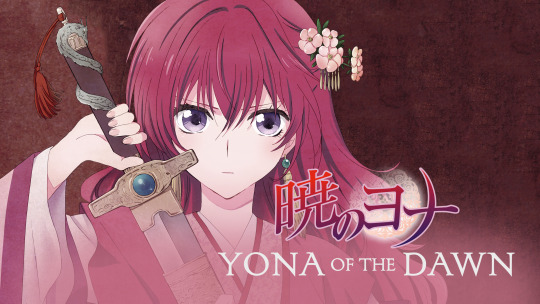
All I have to say about these two anime is that they seemed to be very fascinating premises and concepts, but the anime sadly stops for both. I am considering reading the manga for both of them sometime soon, so this list may change once I do.
Number 5
Hunter x Hunter
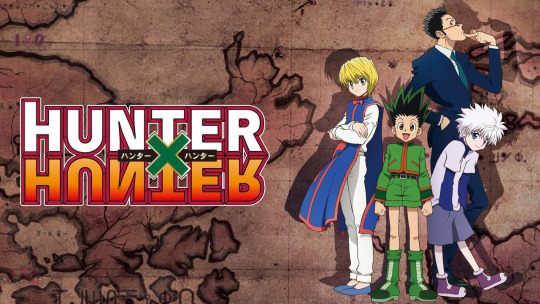
If you like shōnen, I don’t see why you would hate Hiatus x Hai—I mean Hunter x Hunter. The only thing it slightly lacks is a strong main cast, which many people like anyway. Otherwise, absolute perfection. They have most of the best villains in all of anime: Hisoka, Chrollo, Meruem… How can you not love Meruem? And the way he parallels with Gon but in the opposite direction: just perfection. The arcs are hard to rank because they are all perfection in their own right. The best power system in anime is nothing short but perfection. If it weren’t for the Hiatus, it would be ranked fourth. I doubt it would scratch my top three.
Number 4
Full Metal Alchemist: Brotherhood
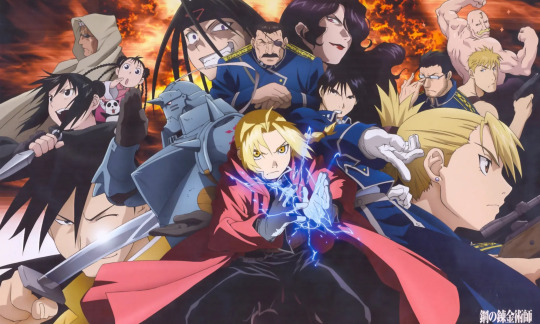
I know I kept saying perfection when talking about Hunter x Hunter, but I actually believe that Full Metal Alchemist: Brotherhood is the perfect series (Note: I am not saying that no one can love it and that it has to be your #1; obviously there are preferences. I’m merely saying that it perfectly crafts what it is trying to portray). The only two arguments you can bring is that the beginning is weak. But if you watch the 03 version, there are no issues whatsoever, in my eyes. Keep in mind, when I say it is the best, I mean from a narrative standpoint. Yes, the animation isn’t the greatest, and the gags are kind of bad, but from a general narrative standpoint, it is the best writing I have ever seen. The plot was brilliant and well-crafted. The world is beautifully bound by their power system: alchemy. The philosophical discussions and themes it explores always have you thinking. The characters are very likable and are all top tier characters. The mysteries keep you in a cycle of confusion and excitement. Since I love science and chemistry, alchemy was so fascinating to me. This show is definitely well-deserving of the number one rank in My Anime List.
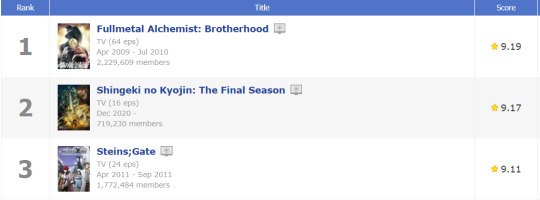
Number 3
Kill la Kill
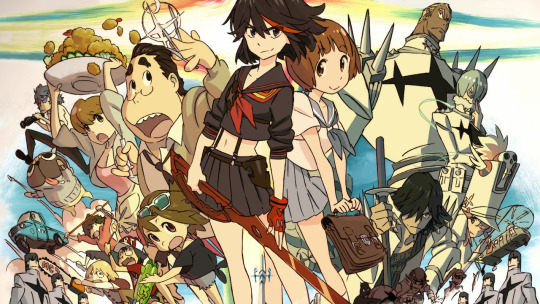
After listing a lot of the best anime/manga with the best stories and narratives, I can see why someone would be upset that I brought up Kill la Kill. This one is certainly the odd one out. However, remember me mentioning that the enjoyment factor is the biggest decision maker in my list placement? Kill la Kill gave me the most enjoyment out of all the anime on this list, even more significant than the obvious #1. I didn’t find anything to be all that brilliant in Kill la Kill, and I can completely understand if someone hated this particular show. But there was something about Kill la Kill that made me feel nostalgic in a weird way. It also gave me one of the weirdest yet most immense feeling of satisfaction I have ever felt. I love Kill la Kill.
Number 2
Konosuba

Okay yeah, this one is also the odd one out, but it is a little more acceptable. I find Konosuba to be the best comedy anime of all time. Not necessarily because it is the funniest anime (I think it is the funniest but comedy is subjective), but instead because, unlike most comedies, like Nichijo, the characters in Konosuba are absolutely brilliant. Kazuma is one of my favorite characters of all time, Megumi is best girl, but I still love both Darkness and Aqua. Their interactions are absolutely entertaining on both a comedic scale and a general enjoyment scale. Their assholeish-type relationship reflects my relationship with my friends (we are complete assholes to each other, but we also love one another).

Not only that but from the comedy focused anime that I have watched, the plot in this one is actually delightful. The Konosuba movie is my favorite movie of all time, right after A Silent Voice.
Number 1
One Piece
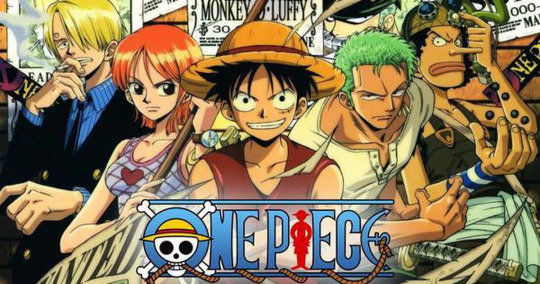
If you read a couple of my previous posts or recognized my profile picture, you probably knew that One Piece is my favorite anime of all time. My love for One Piece is so extensive that I would rather forget all my experiences with anime than forget my experience with One Piece. One Piece inspired me and changed my life. Not in the typical way where I learned a life lesson from the story like Plastic Memories, but simply because I found the writing to be so brilliant. So it was more that Eiichiro Oda, the author of One Piece, inspired me. The characters are the best I have ever seen, the villains are well crafted, the world-building is literally the best in all of fiction, the build-up is fascinating, the questions from the mysteries somehow keep piling over, the symbolism fleshes out aspects of the anime even more, the backstories make characters more relatable and understandable, the general dynamic flow of the world feels like reality, the themes it explores are great learning experiences, the originality never ends, the hype moments keep you energetic for more, the foreshadowing is so phenomenal to the extent where it shouldn’t exist, and the general planning of the story makes it obvious how amazing of an author Eiichiro Oda is.
This series has been airing weekly for nearly 22 years now, the manga for 25. How in the world is Oda able to create this monster of a story, planning certain elements a decade or two in advance? This is brilliance. This is beauty in writing. And I want nothing more than to create a masterpiece of my own.

Final Notes
Emotional, I know. I believe my list here is a bit diverse in terms of genre: shōnen, seinen, romance, comedy, sports, slice-of-life, and mystery. I think it’s a great thing to widen your horizons a bit by exploring various types of genres. Anyway, there are many anime I haven’t watched that could easily replace and dethrone some of the anime on this list. I plan on watching and reading Hajime no Ippo, Gintama, Vagabond, Oyasumi Pun Pun, I”s, etc. I heard these anime/manga are considered the best for their respective genres by many people, and I will probably finish reading and watching these anime/manga in about six months. So I will make a top 15 anime list once again around that time.
If you have any questions or you want to discuss something, feel free to ask in the “Ask Me Anything” tab on my Tumblr page.
#anime#animelove#otaku#animeblogpost#animelist#manga#mangalove#onepunchman#history's strongest disciple kenichi#plasticmemories#a place further than the universe#steinsgate#berserk#haikyuu#orgairu#re zero#mob psycho 100#attack on titan#no game no life#magi#yona of the dawn#hunterxhunter#fullmetal alchimist brotherhood#kill la kill#konosuba#one piece
20 notes
·
View notes
Text
Swallow [Pt.1]

Chapter: Still Yours
Pairings: Bucky x Reader
Summary: You come back home after being gone for five years, and everything is just as you left it.
Warnings: Nothing but angst for this chapter but series: Possessive, jealousy, heavy angst, violence. More to be added.
A/N: This is sort of a continuation of my one-shot ‘Home.’ It’s really more of an expansion on that idea I guess. Same warnings as before. Some possessive behavior from Bucky. He’s still extra soft. Send me love???
***My fics are not to be saved or posted on any other sites without my written permission. Reblogs are my jam though! Thanks!***

February 14th, 2008
James Buchanan Barnes was going to be the death of you.
The way he looked at you. That little smirk. Those pretty blue eyes watching your every move. It made your insides quiver and your heart flip in ways you didn’t know existed outside of terribly written romance novels. You only wished he didn’t do it in the middle of class so you could concentrate on something besides those butterflies in your stomach.
“It’s not just penguins you know. Did you all know that a swallow, once they have found their perfect match, they mate for life and if something ever happens, if they get separated from each other or one of them is injured, they will never mate with another.” The sound of the bell cut Ms. Hill short, and she frowned. “Ah, crap. Well, we can pick this up in our next class. Enjoy the rest of your Valentine's and don’t forget your essays are due in a week!”
Everyone picked up their bags and scurried out of the classroom, you included.
“Sweetheart, wait up!” Bucky shouted, hot on your heels. You tried to bite back the smile on your face and seem annoyed with his persistence. He has been flirting with you and asking you out for nearly a year now, but you’ve watched as he’s dated girl after girl and it never gets passed one date. You weren’t interested in being just another one night to anyone, but especially not to Bucky. The way you felt about him was bigger than one night, and you didn’t think you could survive being cast aside once he got bored.
Besides, if you got involved with him, it wasn’t just him was it? It was everything that came with being him and that included his father’s club.
It didn’t take much for Bucky to catch up to you. He gently grasped your elbow and crowded into your space until your back was flush against the outside wall of the gym. “You know I was thinking while Ms. Hill was talkin’.” He dipped his head down whispering, “You’re my swallow. The second I laid eyes on you. I knew you were it for me and I’d never find another.”
You swore your heart was going to burst right out of your chest and into his hands. Why did he have to say sweet things like that when they were just a line. It wasn’t fair how weak he made you with so little effort on his part. You sagged against him letting him support your weight, but your face remained blank.
“You do realize that every guy in our class is using that same line right now.” You managed to squeak out.
Bucky shrugged. “Yeah, but I’m the only one that means it.”
“Come on.” He whispered as he ran his nose along yours, grinning when he heard your breath catch in your throat. “Go on a date with me. Please? I don’t wanna spend forever alone, baby.” You knew you were going to regret this, but there was something about him… and you couldn’t shake it.
For whatever reason, you couldn’t say no.
“Okay,” you breathed against his lips. “One date.”
He pulled back before your lips could touch. Your first kiss wasn’t going to be against some smelly ass gym if Bucky had any say in it. “I’ll pick you tonight at seven. I’d wear jeans if I were you.” He gives your hip a gentle squeeze. “We’re going on a ride, baby girl.”
Your eyes widen. “But – but! I’ve never been on the back of a motorcycle!”
He smirked. “Good. I like being your first, pretty girl.”
You were such a goner.
--------
For the longest time, this blacktop that raced under you felt like if heaven was anywhere, it was right here with him. Golden rays warming your cheeks, your chest pressed against his harsh leather, the brisk wind making your toes curl. With every turn, your heart would beat a little faster as your arms tightened around his waist as if he was the anchor that kept you safe and grounded. The squeal that would leave your lips every time he sped up, the deep chuckle and gentle kiss to your wrist that followed every single time.
His heartbeat was tethered to yours, and you wouldn’t have had it any other way.
That very same blacktop that held some of your favorite memories was holding every ounce of your pain and heartbreak, bringing it out from the dark place you had it buried. Every inch closer to home brought out another piece of heartache you thought was tucked safely away where it was unable to cause any more damage.
It seemed he could still hurt you even when he was no longer holding you.
You had hoped the sight of your old home would bring you some kind of happiness, but it only felt like another dagger twisting deeper and deeper into your chest. Part of you hoped that all those sweet memories would override the bad, but deep down you knew those good memories never stood a chance. The only thing that brought a smile to your face was the dork standing out front, waving like a complete moron for all your neighbors to see.
Clint jumped off the porch and ran right towards you scooping you up the second you were within arm’s reach. He spun you around a few times before letting you land not so gracefully back on your feet. “Shit I missed you, bug. Been way too fucking long.”
“I talk to you every day Clint.” You replied as you walked back to unlock the back of your jeep, slipping your phone in the back pocket of your jeans as your eyes scan the street for any sign of that black and chrome motorcycle. God must be on your side because there was just some old black SUV parked across the street.
No bikers around. Besides Clint.
Clint rolled his eyes as he followed you around to the back of your jeep. “Not the same as you being here and actually getting to see you.” You shook your head and kissed his cheek before grabbing some boxes. It was only a matter of time before he was brought up. You just wanted to get your things inside, shower and maybe finish off the bottle of wine you stuffed in your suitcase before Clint uttered his name.
Silent bouts of tension filled the air and that was when you knew you weren’t going to even make it through the front door.
“He know you’re back?” Clint questioned as he pulled the two large boxes you were attempting to carry all on your own -- you weren’t on your own anymore, Clint wished you would realize that.
You cleared your throat and reached for some of the smaller boxes and the old wooden box that was wrapped securely in a blanket, refusing to look up and meet Clint’s eyes as you headed for the house. Clint wasn’t going to let it drop that easy though. You knew where all of this was going, and you didn’t want to think about it all just yet. The last thing you wanted to do is think about the man that broke your heart.
After all, he was the whole reason you left town and left your entire life behind.
“Ah, shit. Y/n…” You could hear the disappointment in his voice, and that unexpectedly stung. Clint shook his head. “You know it’s only a matter of time before he finds out. If he doesn’t already know.”
Your disappointment faded and it was quickly replaced a deep ache that nothing could cure. You know, you’ve tried everything to wash his mark off you. There was nothing that could take his claim off your heart.No one except you needed to know that. You looked up at Clint and shrugged as carefree as you could manage with a poised heart infecting every inch of you. Clint didn’t need to know how deeply you still burned for him.
“Why does he need to know, hm?” You dropped the boxes on your old bed and began to unpack, intent on ignoring where this conversation was headed.
“Because you’re his and you know it,” Clint said matter-of-factly. “You’ve been his since we were kids. That doesn’t change because you left town.”
“That was a long time ago.” You whispered. “James Barnes doesn’t have a claim on me anymore.”
The feel of his name rolling off your tongue felt… strange and just as painful as you thought it would. You’ve spent the last five years avoiding anything that had to do with that man as if just the sound of his name on your lips would burn you. The thought of saying it again made your heart race in the most devastatingly beautiful way, and you hated the hold he still had on you.
You were still the fool in love with the past.
Clint’s eyes dropped to your wrist, and you quickly tugged the sleeve of your sweater down before he could get a good look. You knew what he was looking for and frankly, it was none of his damn business. The only people it concerned were you and Bucky. You doubted he would even care what was written on your wrist. He certainly didn’t care what was written within your heart.
“You ever going to tell me why you left?” Clint prodded gently.
“Nope.” You turned around and continued unpacking, avoiding looking him in the eye as much as you could. Clint sighed as he gently kicked the larger boxes towards the closet.
“You’re not supposed to keep secrets and lie to your brother.” He scolded making you snort.
“Adoptive brother.” You corrected. “I don’t think that counts. It’s not even legal Clint. You just took me in, refused to let me leave and tell everyone I’m your sister.”
“Okay, first off.” He pointed a finger at you. “That’s rude and second, it absolutely counts.” A small laugh slipped out, but he could tell you were still all up in your head about something, and it had to do with being here -- with being home. You nearly didn’t come back. If Clint hadn’t begged you, you weren’t sure you would have had the courage. Clint had a feeling it had more to do with who home was to you.
“Hey. Just stop all this.” He insisted. “You can unpack later.”
He grabbed photo albums and shoes in your arms and dropped them back on the bed. “I know It had to be bad for things to go down the way they did. You know Buck didn’t talk to anyone for months? Months, Y/n. Steve had to drag him out of his room and force him to put something besides liquor in him. Couldn’t get him to go on runs. Nothing. He still won’t talk about you to anyone, and no one talks about you around the club. He turned over his patch to Steve the morning you left.”
You blinked and shook your head in disbelief. There was no way he did that. No way he gave that up because of you.
“W-what?”
Clint nodded, “Yeah, he stepped down and reluctantly took the VP patch.” He kissed your forehead and fidgeted with his hearing aids as he backed out of your room, attempting to give you a moment to yourself. “I’ll bring in the rest of your boxes. Think about what you want for dinner but either way, I’m ordering pizza.”
“Pizza is fine and take out your aids. I know they are bugging you, brother.” You called after him. He grinned and pumped his fist in the air like the dweeb that he was.
You sighed and dropped down to your bed eyes landing on the wooden box peeking out from the blanket you had used to try and hide it from Clint and maybe from yourself. “Stop judging me. You’re just a dumb box.” You picked up the judgmental box that was still wrapped in your old blanket and shoved it into the back of the closet setting your box of shoes on top of it.
Some things you still weren’t ready to face.
--------
Damn did Bucky hate listening to the radio when he worked in the garage. It was like that fuckin’ song came on repeat just to torment him every single time. Five years after it all went down, and he still had to listen to it? The damn song is nearly fifteen years old. Shouldn’t there be a limit on how long a song was allowed to be played on the air? This had to be well past the limit.
“It’s been a while since I could say I wasn’t addicted.” Peter sang loudly into the mop handle as he swept around the garage. Bucky looked up over Steve’s bike and narrowed his eyes as the prospect continued on. “It’s been a while since I’ve gone and fucked things up like I always do." Bucky groaned, and Peter only got louder, "but all that shit seems to disappear when I’m with you-- Ow. Shit!” He looked down at the screwdriver laying on the floor and then back at Bucky who smiled.
“You could have taken my eye out!” He squealed as he rubbed the side of his head where the screwdriver had struck him.
Bucky grinned at the kid, “Was aiming for your voice box, but eye would have worked fine.”
“That’s… rude. I don’t sing that bad.”
“It’s not you. It’s the song, Peter.” Steve deep voice rumbled through the garage and his hand slammed down on the top of the radio, silencing the dreaded song. “No music while Buck is working in the garage. Especially not that song. Go find something to clean over there by Sam, kid.” He shoved Peter towards the other end of the garage as he made his way towards Bucky.
“Hey, punk. You come to check on your girl?” Bucky asked with a smug grin, hiding his thanks behind it.
Steve smirked and sat down on the stool next to Bucky and held out one of the two beers in his hand, “Yeah, you fuckin’ jerk.” He nodded towards the bike in front of Bucky. “How she doin’?”
Bucky reached out and took the bottle setting it on the floor next to him. “She’ll be fine. Gettin’ her cleaned up now and a fresh coat of paint as soon as that is done, she’ll be road ready. Maybe don’t lay her down next ride though? Stop being a reckless idiot before Peggy beats your ass.”
“Like I had much choice.” Steve snorted. “Red Skulls are getting out of hand, and I don’t like how much time they are spending in our territory. They need to be dealt with, and I won’t have them this close to the girls. I don’t like it.”
Bucky gave a slight shrug as he spun the wrench around his fingers. There was only so much they could do right now. Sherriff was breathing down their necks. They had runs to make that needed to go unnoticed and starting a war with another club wasn’t the best idea if they wanted to stay under the radar, but Steve was right. If they were willing to lay Steve down in the middle of the day the girls most likely weren’t safe. At least one of the girls were out of danger.
“How you wanna handle it?”
“Not sure yet.” Steve sighed. He was dreading what he had to tell Bucky next. There was no way of knowing how he was going to handle it. “We’ve got a bigger problem right now.”
Bucky sat up straighter and crossed his arms over his chest, an amused grin lighting up his face. “Well, color me interested, Stevie. What’s so important?”
“Y/n is back.”
The grin slowly fell, and his arms dropped to his side. Of all the things he thought Steve was going to say, that was not on the list. In fact, it was nowhere near the list.
Peter leaned over to Sam and whispered, “Who is Y/n? Why does Mr. Bucky look like he’s going to throw up?”
Sam sighed and shook his head, eyes stuck on Bucky. “Stop calling him Mr. Bucky. It’s weird. It’s just Bucky and don’t worry about her. She’s… She’s Bucky’s, old lady.”
Peter frowned, clearly confused. He was so little when Y/n left and didn’t spend much time around the club. No one has ever mentioned her before, and he has never seen Bucky with a woman or even talk about one. Now he has an old lady? “I thought he was single. He never talks about her.”
“Go get the bar set up for tonight before Bucky kills you.” Sam grabbed his shoulders and walked him towards the clubhouse. “I don’t want to find another recruit to replace you because you can’t keep your mouth shut about Y/n. If you want to see tomorrow, you won’t bring her up to Buck.”
Bucky cleared his throat and looked down at the wrench in his grease-stained hands. “Where did you spot her?” He whispered, trying to keep his voice clear of emotion. It would have worked if he was talking to anyone else. Steve knew him too well to be that easily fooled.
Steve watched him carefully, deciding how he wanted to answer. He wasn’t sure what was going on in his head, but he knew when it came to Y/n Bucky didn’t always think things through. That’s how several men ended up in the ICU for getting a little too handsy. Either he jumped on his bike drove over to Clint’s threw her over the back and dragged her ass back to the clubhouse, or he enlisted whiskey to help wash away any memory of her, and he locked himself away from everyone. Steve didn’t have any other options though, he knew Bucky would tear up the town looking for her if he refused to tell him.
“She was at home. With Clint. Her jeep was fully loaded, and he was helping her carry stuff inside.”
His heart flipped, and he swore it dropped into his stomach. He didn’t want to get his hopes up, but he couldn’t help the part of him that was already begging to have her back by his side, “She’s home for good then?” He asked, hopefulness creeping up in his voice even though he tried to suppress it.
“Maybe,” Steve shrugged. “I didn’t stop in. She’s at least home for a long visit with the amount of stuff I saw Clint unloading from her jeep.”
A long visit. Bucky had a feeling that wasn’t it. Not with the way they left things. She wouldn’t have come back if she didn’t intend on making it a forever move. Then again, she didn’t let him know she was coming home. That’s alright. He can work with tats as long as she was back. He won her heart before he can do it again.
“You gonna go see her?”
Bucky ducked his head, letting his hair cover his face and hide the small smile pulling at his lips. He’s been waiting for this day for five years. It was only a matter of time before she came back home. Before she came back to him.
“Nah.” He breathed. “When she’s ready she’ll find me.”
They always find their way back to each other.
It just takes her a bit longer to find her way back.
Masterlist // Next
#bucky barnes x reader#bucky barnes x you#bucky barnes x y/n#biker!bucky#biker!bucky x reader#biker!au#james bucky barnes#james buchanan barnes#alternate universe#MC!Bucky#MC!AU
2K notes
·
View notes
Text
Hard-Boiled Fantasy
So a conversation from @firefly124-writing about the TV show Supernatural and where it exists in relation to horror got me to wondering about the origins and trappings of what we now consider the “urban fantasy” genre, which I realized I haven’t really dug that deeply into before.
That sounded like a fun rabbit hole to fall down, so I figured I’d do a bit of digging!
So the initial question was: Is Supernatural a horror show?
It kind of seems like it should be, right? There’s ghosts and demons and all manner of other things that go bump in the night.
But structurally, it sure doesn’t seem like a horror. In horror stories, the monsters usually hunt the characters, not vice versa. And the story beats are all wrong. In fact, if you subbed out monsters for regular criminals, you’d pretty much just have a crime drama.
And in that respect, Supernatural is hardly on its own. In fact, there’s a ton of supernatural crime fiction - from Laurell K. Hamilton’s Anita Blake series, to Jim Butcher’s Dresden Files, to Angel (not so much Buffy, more on that in a minute) and many, many more besides. In fact, the whole genre of “urban fantasy” seems to have some hefty overlap with supernatural crime stories – but are the two interchangeable? Or is there more to it?
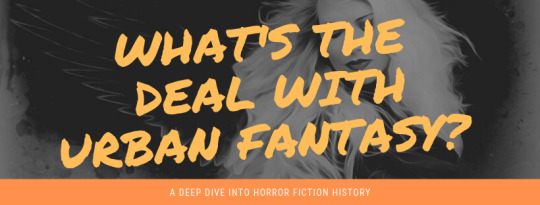
First Off: What the Heck is Urban Fantasy?
Our benevolent overlords at Barnes & Noble compiled a handy list of recommendations for Urban Fantasy series (https://www.barnesandnoble.com/blog/sci-fi-fantasy/12-urban-fantasy-series-to-binge-read/), and looking at them side-by-side, we can begin to see some trends:
Super-powered and/or badass main characters
Serial format that lends itself to a “monster of the week” type storyline
Crimes and/or supernatural political intrigue
But are they, like, the defining traits of the genre? Let’s investigate further..
According to this article from Writer’s Digest, there are a few key ingredients: setting as character, a central mystery, character-driven story (often in first person narration), and a romance subplot - https://www.writersdigest.com/online-editor/5-elements-urban-fantasy-novels-must
But I take some issue with that. I think there are a fair number of stories that feel like they should qualify as “urban fantasy” without ticking off all of those boxes. Setting aside everything that could be considered “paranormal romance” - your Twilight and True Blood and whatnot (Buffy slots here better, maybe)- there’s still plenty of things that seem like they should be urban fantasy, like Neil Gaiman’s Neverwhere or Lev Grossman’s The Magicians or Charles de Lint’s Newford series, or War for the Oaks by Emma Bull.
But it’s OK - urban fantasy is large, it can contain multitudes.
The real question is, why is so much of it just supernaturally flavored crime fiction?
The Origins of Crime Fiction
Crime fiction/mystery/thriller is the second-most popular book genre, coming in right behind romance for sales: https://bookstr.com/article/book-genres-that-make-the-most-money/
With that in mind, it kind of makes sense that you’d want to fold crime fiction elements into other types of stories. A genre that popular and ubiquitous is going to have lots of familiar tropes and appeal to a lot of people.
And as it turns out, crime fiction has its roots tangled quite deeply with horror fiction – so deep, in fact, that the granddaddy of all detective stories is none other than Edgar Allan Poe.
Poe’s character C. Auguste Dupin – from famed stories like “The Purloined Letter” and “The Murders in the Rue Morgue” – lays down the template for detective stories in the 1840s, from the eccentric gentleman of leisure turned detective to the impossible crimes explained by the power of deductive reasoning. That template would then be lifted almost wholesale by Arthur Conan Doyle in the 1880s with his Sherlock Holmes stories.
And, really, it shouldn’t be a particular shock that detective stories started to really take root in this time period. In a post-Enlightenment world, we were collectively struggling with our relationship to nature, science, industry and the mysteries of the universe. Even as we continued to fear things that went bump in the night, we increasingly sought to rationalize it all.
There was also, of course, more crime – and, thanks to developments in both city living and news reporting, people were aware of those crimes. Jack the Ripper captured public imagination and inspired terror with his murders in 1888, about the same time as H.H. Holmes was running his murder hotel in the United States.
So with that in mind, is it any surprise that crime fiction entered its first Golden Age in the 1920s and 30s – a time when organized crime was at its peak thanks to Prohibition?
What is especially interesting to me is that even as horror waned in popularity in the 1940s and 50s, crime fiction was entering a second Golden Age thanks to Film Noir and all of its now-familiar tropes – from world-weary detectives to beautiful dames in trouble and rain-drenched streets.
Some reading you may find interesting on that topic, especially in regards to how the Noir genre survived the Hays Code: http://hayscodeandfilmnoir.blogspot.com/ and https://vicolablog.wordpress.com/2017/06/05/film-noir-and-the-hays-code/
Putting it All Together
So with this historical context firmly in mind, I think we can make a few logical conclusions.
First, I think it’s safe to say that people like crime stories because they tap into cultural fears and fascinations – crime is something that we are all aware of but which most of us have fairly little hands-on experience with, so it’s only natural that we’d be morbidly curious about it. Crime is interesting because it’s dangerous and taboo, and that makes for good storytelling.
Second, it also seems safe to say that many people prefer crime stories to horror stories because they are more comfortable to consume:
The hero is usually empowered rather than powerless
Justice is usually served at the end (whereas horror tends to have a bleak outlook)
The overall feeling can be fun/adventurous/even silly and largely safe, despite the presence of a murder – see the entirety of the “cozy mystery” genre
Mysteries tap into a puzzle-solving, intellectual aspect of the audience as opposed to a visceral/primal response
Now obviously these lines are drawn in ever-shifting sands. There are plenty of horror stories that are primarily intellectual, and crime fiction can be plenty bloody and visceral. And that’s not even touching on the cross-overs like Thomas Harris’s work or the entirety of giallo filmmaking: https://vicolablog.wordpress.com/2017/06/05/film-noir-and-the-hays-code/
But by and large, speaking in general terms, I think we can make an argument that there is probably a somewhat wider audience for crime/detective stories than for horror specifically because the intended purpose of horror is to make the reader/viewer uncomfortable, and a whole lot of people dislike feeling uncomfortable.
So with all of that in mind, I don’t think it’s too much of a leap at all to see how our modern understanding of urban fantasy as a supernatural crime thriller got its start.
By taking familiar horror tropes that have slipped into pop culture – monsters and demons and zombies and whatnot – and then folding them into the comforting tropes and narratives of popular crime fiction, creators can delve into everything that is cool about horror without the icky, alienating bits that make people feel bad.
(I’d also posit that this type of storytelling is gaining an increasingly powerful foothold in modern times because it side-steps some of the more problematic aspects of realistic crime fiction – ie, the socio-economic status of most criminals, the corruption of the legal system, etc. By making fantastical creatures the perpetrators, we can skip the discomfort of due process and human rights and focus on the fun parts of solving crimes with a clear conscience)
But that’s just one opinion, from an admittedly biased horror blogger. I’ll leave you with this final essay on the topic, which follows a similar path and draws a different (but quite interesting) conclusion – https://carriev.wordpress.com/2012/04/16/the-long-and-diverse-history-of-urban-fantasy/
PS - if you like these deep dives and want to support me in doing more of them, don’t forget to drop a tip in my tip jar: Ko-fi.com/A57355UN
174 notes
·
View notes
Text
Capsule Reviews - June/July 2020
I didn't read as many comics that I felt the need to write about these past couple of months, but the ones that I did I generally had a lot of thoughts on.
Hawkworld
Back in 1989, DC attempted to revamp Hawkman, notoriously the most confusing character in a stable comprised of confusing characters, with Timothy Truman's Hawkworld, a dark, modern take on the sci-fi version of the character. The result is flawed in the most frustrating ways, just good enough that parts of it feel like they could be coming from a hidden classic of DC's back catalog, but never living up to its potential. The story entirely is set on Thanagar, casting Katar Hol (Hawkman) as a privileged heir who has thrown his lot in with the police force and pines for Thanagar's lost golden age, when men were men and heroes walked the Earth. The first couple of issues do some genuinely excellent work depicting Thanagar as a corrupt and crumbling empire which bears more than a little resemblance to the USA and casting Hol as a well-meaning but ultimately deluded dupe whose role as a cop makes him at best complicit in his culture's worst excesses.
Unfortunately, the second half of the series never manages to live up to the first half, skipping forward in time by about ten years and ditching the systemic critique of its first half. Instead, the corrupt police commander who had previously appeared as a symptom of Thanagar's ills is turned into a literal monster, a strawman for the newly christened Hawkman to soundly thump over the head in place of addressing larger issues. The systemic concerns of the series' first half are never meaningfully addressed in the later issues and Hawkworld ends up falling back into being a simple tale of good cops versus bad cops, despite the first half of the series having been largely unambiguous about cops' nature as agents of state violence and imperialism. It's a shocking and deeply confusing disconnected that I can't tell if it's because I'm bringing modern politics and assumptions to the book or that someone at DC completely lost their nerve halfway through. This is what makes Hawkworld so frustrating to read, on the one hand its insightful and anti-colonial and surprisingly relevant to 2020, but on the other it never commits to those ideas because doing so would be too radical, the end result is a book which is very good right up until the point that it completely wimps out and shuffles back into mediocrity.
She-Hulk
After a long interval of living, unread, in my Comixology files, I finally read She-Hulk by Charles Soule and Javier Pulido. The quality of the series almost goes unsaid; it's one of the best of its era and niche, a part of the a whole constellation of early to mid 2010's "street level" Marvel superhero books which started, more or less with Daredevil and Hawkeye, ran through She-Hulk and Spider-Woman, extended into Hellcat and debatably Squirrel Girl, and then fizzled out several years ago. I try to fight nostalgia back most of the time, but it can't be overstated how good that whole wave of titles was, almost universally fun and approachable, grounded and empathetic, and with top-notch art across the board. Anyway, She-Hulk by Soule and Pulido is fantastic. It keeps to a relatively straightforward procedural style, makes the courtroom antics feel real thanks to Soule's actual background as a lawyer, and connects with the Marvel Universe in ways which set it among the others without ever feeling too overwhelming. The whole deal with The Blue File, the series' overarching mystery is well handled and does something really interesting with Nightwatch, an absolutely nothing character, who I'm a little disappointed we haven't seen turn up again since this reinvention. Reading She-Hulk made me nostalgic for this whole era, of which this series was one of the best.
The Adventure Zone: Petals to the Metal
Petals to the Metal is the arc where the McElroy family's The Adventure Zone podcast found its footing and really began to blossom into the series that it would become, so there were a lot of expectations riding on this entry in the graphic novel adaptations of the series. Generally speaking, it continues to nail most of what made the series work and polish the story into something a little more refined and coherent. The narrative trimming and changes done are smooth, the jokes still work, and its able to foreshadow events in a way that the podcast, given its nature as an emergent narrative, could never really do. Carey Pietsch's cartooning remains fabulous, and what makes this story work as a graphic novel must certainly be credited to her. This series remains the defining work of her young career and while I greatly enjoy what she's doing, I do wonder if she's really going to stick around do all seven potential books, especially if they keep ballooning in size. The only criticisms of Petals to the Metal as a comic are much the same as could be made about Petals to the Metal as a podcast and the big one is the main characters are kind of incidental to the story and don't feel like they have an important role in the emotional climax. Such is the nature of trying to tell a story in a DnD campaign, and its something that TAZ would get better at subsequently, but in graphic novel form hard not to think about. Without as clear of a distinction between "player characters" and "non-player characters" it's not quite as strange to see the main trio take a back seat, but without the charisma and speed of the podcast form it's much easier to sit back and say "wait, the main character's aren't even doing anything here". This volume is also noticeably thicker than the first two volumes of The Adventure Zone, and I hope that this series isn't going to swell, Harry Potter-like, with each entry, if only for the sake of Pietsch not keeling over from the effort.
Batman: Last Knight on Earth
Supposedly the capper to the Batman stories Snyder and Capullo's started telling all the way back in 2011 with the New 52 reboot of the character, though that's a little hard to swallow when they are still very much doing a bunch of Batman stuff in their current Death Metal event series. It's Batman playing in a post-apocalyptic DC universe, bombastic and unhinged, upending the toy box and smashing things like there's no tomorrow. It's fun, beautifully drawn, and incredibly over the top, but it's not going to be for everyone. For one thing, it's a tour of a ruined DC universe, so it's not exactly kind of most characters; there's a lot of death and mutilation and grotesqueness abounds. It's also deeply, deeply, misanthropic. I've got an essay talking about the politics of this book at greater length ready to go up at some point, but the short version is that this is a comic which starts off with an incredibly unsubtle allegory for the 2016 election and then ends with a big, cheesy hope shot that means absolutely nothing.
Even beyond my political reading of it, not everything about the story works. Snyder and Capullo's Batman work has had a ton of Joker in it and his role here is obnoxious and contains a bafflingly unearned redemption arc. More importantly, the book is built on misanthropy and the evil that ordinary people do but is completely unable to actually confront this thematically or narratively. It's a major thematic shortcoming.
I'm reminded of the ending of Grant Morrison's Batman Inc, a similar endpoint to an era of Batman which was fundamentally informed by the rejection of Morrison's vision by the rest of DC Comics. It's a bitter, angry book, but still beautiful and engaging, and fun to talk about.
Batman Universe
The complete other end of the spectrum from Last Knight on Earth, Batman Universe is a glorious romp through the DC universe, exploring the setting and characters and having fun in this day-glo fantasia. Nick Derrington knocks the art out of the park, and the constraints of shorter chapters mean that Brian Bendis' writing is more succinct and energetic than I've ever seen it before. I've idly wondered for years now why there's no current Batman animated series, and Batman Universe seems very much designed as the equivalent of one: the ties to current continuity are nearly nonexistent, the art is distinct and skews away from pseudo-realism in favor of pop aesthetics, and the approach in general is lighthearted.
It's not the deepest book, at least on an initial read, it's pointedly light fare, but it's still incredibly good. It is an unabashed, all-caps SUPERHERO STORY that doesn't feel retro or dated.
1 note
·
View note
Text
APRIL 09, 2020
It's All Over but the Shouting
Wafers-
A few months ago, David Masciotra, a free-lance writer and author of Against Traffic, among other works, approached The American Conservative with a proposal for an article, which would be a review of my American Empire trilogy. He subsequently submitted the article, and never heard back. Since I'm neither a conservative nor a progressive, but only a writer interested in Reality, it's possible that TAC got spooked by David's essay. (To paraphrase T.S. Eliot, "Americans can't bear too much reality.") However, it's also possible that by that time the coronavirus was starting to make itself visible, and that TAC was thrown by that rather than anything ideological. I guess we can give them the benefit of the doubt. In any case, David and I agreed that I should just post his essay on my blog, and accept the fact that no American publication was likely to run it (for whatever reason). Hence, here it is.
It’s All Over but the Shouting: Morris Berman’s Work on American Decline
“Stick a fork in their ass, and turn them over. They’re done,” Lou Reed dryly announces on his 1989 song about the American Empire, “The Last Great American Whale.” The rock and roll poet’s grim diagnosis of a culture gone awry makes for a fine lyric. If Reed were to have expanded his morbid one-liner into a 1,000-page trilogy of books, full of assiduous research, brilliant anecdotes, and despite the sad subject matter, immensely enjoyable, and often amusing, prose, he would have something resembling the series of books on American decline from cultural critic, historian, novelist, and poet, Morris Berman.
Berman, while a visiting professor in the belly of the beast at the Catholic University in Washington, DC, began writing the first installment in the late 1990s,The Twilight of American Culture, after observing the coalescence of several pathologies that are now beyond dispute as inflicting pain on American life: staggering rates of inequality, governmental dysfunction, an ever-expanding militarism, the fracturing of communal and civic life, and the dominance of anti-intellectualism, visible in everything from an increasingly shallow pop culture to misspelled words on public signs. There was also an aura of threat in the air, of the kind predicted by Don DeLillo in his 1985 novel, White Noise. Like the thick presence of humidity on a summer afternoon, Americans couldn’t see that their neighbors were becoming selfish, and often cruel, but they could feel it.
Having studied the downfall of other empires, Berman saw the window for American reform closing. He warned that if America did not drastically transform its public policies, ideology, and working conception of citizenship, its troubles would only intensify and calcify, bringing a once-promising civilization past the point of no return. In the two books that followed—
Dark Ages America
and
Why America Failed
—Berman meticulously demonstrated that America’s myopic focus on profit, at the expense of everything else, its zest for war – at home and abroad – and its lack of self-awareness and insight had escalated, making recovery virtually impossible.
Simultaneous with the development of Berman’s argument, the United States suffered the worst attack on its soil on September 11, 2001, and responded by launching not one, but two disastrous wars. Its housing market and financial system crashed, liquidating much of middle class wealth, and it reacted with giving away boondoggles to the very parties of greed that caused the crisis. Then, in 2016, as the citizenry began to stratify in ways more violent and intractable, Donald Trump became President-Elect. Berman, whom the New York Times and other mainstream outlets dismissed as cynical, cranky, and “anti-American,” looks more and more sterling.The left and right argue about nearly everything, making extreme accusations about each other. Maybe one camp is right on other issues, and the other is correct on some, but the larger possibility to consider is, what if they are all wrong on the main issue?
As Berman put it during a recent email exchange that I had with him:
Conservatives and progressives alike are patriots; like Trump, they seek to save America, or make it great again. What they are ignoring is the rhythm and record of history. All civilizations rise and fall; there are no exceptions to this rule, and America is not going to escape its fate. The great Southern historian, C. Vann Woodward, first suggested the inevitable decline of the nation in 1953. Andrew Hacker stated it clearly in The End of the American Era, 1970. Between that year and today, there have been a host of books—my trilogy on the American empire included—that have pointed out that civilizations come and go, and that now is our time. Yet on both the right and left, there is no recognition of this bedrock reality. If you do recognize the larger picture, you can't possibly care about impeachment, for example, or who wins these silly Democratic debates. All of that is theater, not reality.
The reality is ascertainable from the daily deluge of grim headlines—lead poisoning in the water causing irreversible brain damage in children, the rise of the “working poor,” near-daily mass shootings, America spending hundreds of billions on weapons of war while ignoring its crumbling infrastructure. Pundits and politicians have a tendency to treat all of these signs of pathology and dysfunction as isolated, but an unobstructed historical vantage point, which Berman’s work provides, suggests that all of America’s problems—from high rates of functional illiteracy to political corruption—are trees growing out of the same rotten roots.
Berman’s project becomes more excavation than analysis, demonstrating an affinity for radicalism, in the original sense of the term, which is identifying and criticizing an issue’s origin, rather than obtusely obsessing over its consequences. America, from its inception, was dedicated to commercial conquest, and equated “the pursuit of happiness” with the acquisition of wealth and property. The third book in Berman’s trilogy, Why America Failed, relies on assiduous research and sharp analysis to prove the case over its 400 pages. Meanwhile, the consistent papering over the more accurate story he tells, with red, white and blue advertisements, robs even many of the country’s leading dissidents of a holistic perspective. In his deployment of cultural criticism, Berman shows how, although his politics tend slightly toward the left, he is most in mourning over America’s destruction of tradition and refusal to balance its desires for commercial dominance with small scale, communal concerns:
Dating back 400 years—the continent was filled with individuals whose idea of the good life was goods, i.e. money and property. There were dissenting voices, such as Capt. John Smith and the Puritan divines, but these were increasingly pushed aside. The title of Richard Bushman's book, and the book itself, are good summaries of the process: From Puritan to Yankee. America was effectively born bourgeois; it had no feudal period. And while feudalism had its obvious drawbacks, it also had some serious advantages: community, craftsmanship, ties of friendship, meaningful work, noblesse oblige, and spiritual purpose, among other things. The American experiment was based, from the first, on hustling, opportunism; this is what the "pursuit of happiness" really meant in the eighteenth century—go out and get yours (which the Founding Fathers certainly did). "Virtue" originally meant putting the needs of society above one's own personal interests. By the late seventeenth century, the meaning had been inverted: it now meant personal success in an opportunistic environment. Blaming the corporate elite has its limits, because what virtually all Americans want is to join the upper 1 percent. Thus American spirituality, such as it is, can be summarized in a single word: More. More, more, I want more. Our leaders reflect our values, which is how America's consummate hustler, Donald Trump, wound up in the White House. In that sense, we have a genuine democracy.
In his seminal essay, “Democratic Vistas,” Walt Whitman worried that “genuine belief” had left American life. In the mad race for money and status, Americans were forgetting or neglecting the sociopolitical principles that could construct a spiritually strong society. For “genuine belief” to thrive, the believers must, in spite of their partisan or ideological disputes, maintain some adherence to tradition – a set of ideas, rites, and practices that form the foundation of their politics, behavior, and vision for the development of their culture.
Berman attempts to achieve a balance in his cultural and historical analysis by spotlighting societies where edifying traditions are steadfast, helping to anchor their respective cultures, and help inhabitants connect to each other with a shared sense of purpose. In Neurotic Beauty, Berman writes about Japan’s traditions of craft, family, and advantageous use of empty space in art and identity, and how those traditions are under siege by Japan’s own move to large scale, corporate capitalism. In Genio: The Story of Italian Genius, Berman examines the Italian gift of injecting space, movement, into static situations – the result of which is, arguably, the most significant creative legacy in the Western world.
It is not only through travel and study that Berman is able to contrast cultures that maintain some loyalty to their best traditions with the American fixation on commercial, technological, and militaristic “progress,” but also through his own experience. He asserts that the “best decision” of his life was moving to Mexico, and one of his worst decisions was waiting so long to do it. When I asked him about the “traditional society” of his Mexican home, as juxtaposed with his previous home in Washington, DC, he began with the caveat that “Mexico has been heavily Americanized, and traditional values—community, friendship, craftsmanship, spirituality—have accordingly been eroded in favor of hustling, individualism, alienation, and meaninglessness.”
Nevertheless, his move to Mexico was a “bet” on the lasting elements of tradition and communal life in Mexico, and it is one that has proven itself wise. Berman offers an anecdote to illustrate the camaraderie and generosity that often characterize his relationships and interactions in Mexico:
Something like this happens to me at least once a week, and it always wakes me up to the fact that I am not living in the US anymore. I live in an apartment building in Mexico City, one floor up. One day I was coming home from the supermarket, going up the stairs, carrying plastic bags full of groceries, and one of the bags broke. Contents spilled out all over the stairs and onto the ground: oranges, Diet Coke, whatever. At that point, at the top of the stairs, the door to the apartment there opened, and a 5-year-old girl peered out. Without saying a word, she came down the stairs and helped me put the spilled groceries back in the bags. When it was done, she went back upstairs and closed the door.
Berman would not argue that acts of kindness never take place in the United States, or that every single Mexican behaves according to an ethic of solidarity, but the rarity of friendly relations in America, and the breakdown of community, as documented at length by Robert Putnam, Sherry Turkle, and many other scholars, is not accidental.
“For one thing, girls are taught to fear men, in America (possibly with good reason),” Berman said, and added, “The sexes pretty much hate each other, or are at least wary of each other. But equally significant, Americans of all ages are taught to not help other people (we even arrest people who attempt to feed the homeless). Their problems are their problems, not yours. You are not your brother's keeper, and in general other people are rivals or enemies.”
America has failed to enact the social welfare policies of its democratic peers in Western Europe, but what Berman indicts goes to deeper to core of America’s character. America has also neglected to preserve its “bonds of voluntary association” that Alexis de Tocqueville believed were crucial to the health of the society. In that sense, Americans interested in conservatism might consider that their country is the least conservative in the world. It invests almost no effort in conserving anything, from the beauty of its natural environment to the social ties that are essential for a durable civilization.
The improvements of American life for blacks, women, gays, and workers were possible through the courageous social movements of the 20th century, and these are improvements that Berman admires. He cautions, however, that none of them address the central problem of American culture:
Those were certainly great successes, and they made a great difference for the people involved in those movements. Personally, I applaud them. The problem, however, is that all of them were bids to have a greater share in the American pie—bids to enter the dominant culture. None of them envisioned, a la Lewis Mumford, Henry David Thoreau, or Ernest Callenbach, a different type of society. They merely wanted a greater role in the society as is. The only group that stood for a completely different way of life was the Native Americans, and look what we did to them. The savagery of that genocide, of a people who dared to disagree with the American definition of "progress," is unbelievable.
When Martin Luther King turned more radical, expressing opposition to the “spiritual sickness” of America, rather than only its racist laws, the country turned on him. Similarly, Berman describes in his trilogy how most of the public mocked and ridiculed President Jimmy Carter for his televised "Spiritual Malaise" address, given in Annapolis in 1979—a speech that now appears prescient in its condemnation of uncontrolled consumerism, unabashed selfishness, and the stunning inability of the nation to observe its own behavior.
The candidates in the 2020 race for the presidency, including the president himself, routinely repeat the bromide that the election will determine the “direction” of the country. The "soul" of the nation is somehow always at stake, and yet regardless of who gets elected, things continue to spiral out of control. Morris Berman’s sobering assessment doubles as a “Dead End” sign, warning that the winner might influence the speed and comfort of travel, but that ultimately, we're headed for collapse.
3 notes
·
View notes
Text
Levi’s role in Eren’s development and why “Eren vs. Levi” won’t happen
I mentioned recently my opposition to the idea that Eren would hurt or even kill Levi in order to further pursue his goal - whatever exactly it may be. Furthermore, I am not personally foreseeing an “Eren vs. Levi” showdown approaching. I feel like I should elaborate on that.
Eren and Levi have always had a compelling relationship, in my opinion. Where other people have either feared or blindly adored Eren, Levi has always seen him for what he is and accepted him. Likewise, Eren has almost always looked to Levi for guidance and inspiration, but was quick to understand Levi is as fallible and human as anyone else. I'm gong to cover some points as I try to explain myself here.
Isayama has stated before that Eren may have to march in Levi's shadow in order for the story to progress in a certain way.
I think that we are clearly seeing the result of that now. Where Eren used to convulse and shake when he was angry (and in general, very expressive and impulsive), something Isayama stated Levi once did too, we have now come to see an Eren who pushes what he's feeling down in order to focus on his goal. This is very similar to Levi's demeanor and something we only see from them as they are now when they've become deeply emotionally compromised.
It's not that Eren has become cold, detached and unfeeling toward his peers. Rather, he's come to learn that he cannot let his emotions and feelings about them dictate his behavior if he is going to save them. He must control himself if he is to get anything done. Since Levi goes about things in a similar manner, he's in one of the best positions to understand Eren as he is now. Thus, I believe that he is one of the more likely people to get through to Eren at this time.
Additionally, it’s good to remember that Levi told his squad plain as day that he was willing to "become a mass murderer” if it meant humanity at large would have a chance at surviving. Eren is doing the same for his friends and the island now. He has picked up on the things Levi has said and done and has started to absorb it into his own actions. Again, if anyone will understand this point of view, it will be Levi.
I think that, if we are to take this sort of parallel between them and assume that Eren has adopted more of Levi’s approach toward achieving his goals, at the very worst Eren would do something minor to get Levi out of the way (as Levi tried to do to him during the serumbowl) - but nothing that would put permanently harm him.
Levi's views on Eren per their Visual Novel
In Eren and Levi’s shared visual novel, Burning Bright in the Forests of the Night, it's stated very clear that Levi understands well the essence of Eren's character.
Humanity’s Strongest understands Eren Jaeger very well.
Eren Jaeger is indeed feared as a monster.
Eren Jaeger is undoubtedly a monster.
But all these people have gotten it wrong from the start.
Eren Jaeger is not a monster because he has the power to shift into a titan.
When Levi states that Eren is a monster in the Forest of Giant trees, he’s implying that it’s Eren’s nature that is to be feared, not his shifter ability. This is something that Levi has seen since their very first formal encounter. Eren as he is in the current timeline is showing this nature for all the world to see now. But Levi was the one who saw it first, completely unadulterated nor filtered through personal affection.
Nothing can be done to control this monster.
Not violence, power, words.
Nor danger, fear, peace.
And, most likely – not even love.
And again, this is something that we are seeing now. Eren’s will keeps pushing him forward, no matter what. When he’s determined and has his mind set on something, nothing can stop him from trying to pursue it. Eren has expressed the love he holds for the 104th (and hopefully by extension, Levi and Hange, who have also been through a great deal with him). However, no matter how much he cares about them, he’s come to be a person who keeps moving forward with or without them - possibly to the point where he may even be willing to push them away. Levi gets it.
Eren Jaeger’s essence can never be changed.
As early as the Female Titan arc, Levi understood that Eren was someone who can’t be tamed or caged. And no matter how many times the story has tried to beat him down, he keeps moving forward. He keeps fighting.
The novel ends with an excerpt from the poem “The Tyger,” although that requires a long winded essay I don’t want to clog up this post with. But in essence, it’s about a man looking onto the beast in awe of it’s beauty, but understanding its raw, primal power. The inclusion of this poem tells the reader that Levi is looking at Eren in this way. Regardless, Levi has been using his position and his role in Eren’s life to try and guide him down the best possible path, even if he’s not sure he always does a good job of it. But it’s enough to show that he cares about what Eren does with his power.
Levi's role as a mentor/”big brother” to Eren
Levi was recently described as a character who is like a big brother to the 104th. And as we have seen throughout the story, he has guided and mentored them. Most notably we have seen this through his interactions with EMA. In the case of Eren, we have seen Levi repeatedly offer him advice, understanding and concern:

Chapters 25 & 26 - When Eren accidentally transformed and his squad turned their blades on him, Levi was quick to step in between them, stating that his intuition is guiding him to believe Eren is not a threat. This is the first show of understanding we see from Levi when it comes to Eren’s intentions and what he wants to do. Eren isn’t a traitor. He wants to help the Survey Corps and Levi sees and understands that. This was very profound at the time, given no one was willing to trust in Eren other than his friends since childhood. It was especially jarring, given that Levi had vowed to take Eren down if he did anything wrong.
When everything is sad and done, Levi checks in on Eren to see how he’s feeling.

Chapter 26 - After Eren’s accidental transformation, Levi offers Eren words of advice, explains why his squad turned their blades to him, and also is sure to make Eren understand that they did not enjoy doing it. That they want to have faith in Eren. He’s been real and honest with Eren since the very beginning, but he’s always managed to do so in a way that helps Eren to understand and is never overly harsh toward him.

Chapter 25 - Levi’s iconic “no regrets” speech. When Eren is discouraged from acting on his own accord in favor of trusting in his comrades, Levi gives Eren words of advice on the spot. He encourages Eren to make his own decision - to trust his intuition, and make the choice he will regret the least. Eren even believed in retrospect that if he had transformed, Levi may have fought alongside him. This scene is always a good one to come back to when looking at their overall relationship and Eren’s development as an individual.
When Eren chose to put himself in the hands of others, they ended up dead. But later, when Eren is faced with other tough decisions, believing in himself is what saved them. When it comes to the current events of the manga, I think that this mentality is holding up strongly with Eren. He must believe in himself and his own strength if he is to accomplish anything. Levi, having given him this advice, is in a position to understand his line of thinking.
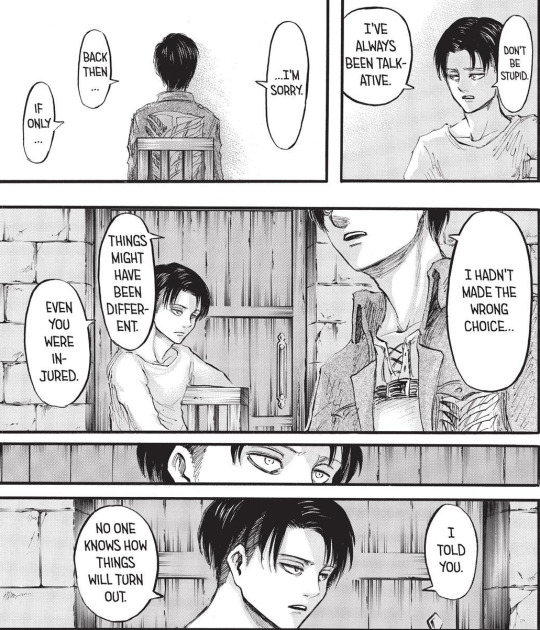
Chapter 32 - After Squad Levi is killed by the Female Titan, Eren blames himself for it completely. He believes that putting his faith in them is the wrong choice and what led to their deaths. Levi watches Eren as he laments his decision, he really soaks in the fact that Eren is carrying that burden, and chooses to reassure him that it wasn’t his fault. He had no way to know that things would turn out that way, and he shouldn’t put the burden on himself over it. Levi is extending to him kind understanding in the wake of loss and trying to alleviate the burden.

Chapter 53 - Eren and Levi are motivated by similar goals. Eren seeks freedom and Levi validates this by stating that he wants the same thing. The walls stink, they are suffocating. They live in a cage like livestock. Similar ideologies. Levi fights for his people and it’s something Eren wants to do as well. This is a way in which they can relate to each other. Even in the current timeline of the manga, they both want what’s best for their people.
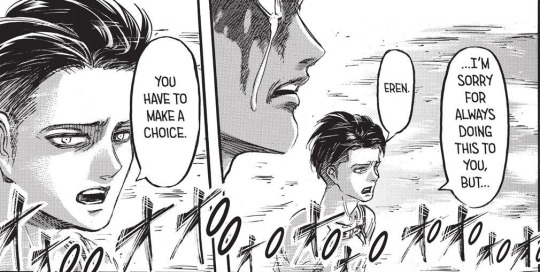
Chapter 66 - Eren is under pressure, and Levi knows he’s about to add onto it. He apologizes for it. It’s a scene that shows Levi doesn’t want to keep putting the burden of pressure on Eren. That he verbally expressed as much is, in my view, a big deal for both the readers, and Eren.

Chapter 70 - When Eren is overexerting himself, Levi is the first one to notice and offer him a hand. As Levi is helping Eren out and showing him compassion, he also notes his concern about the toll it’s taking on his body and advising Hange to take it easy. Despite this, Eren insists that they keep making weapons with his power so they can get to Shiganshina. Here I’m sure Levi can also see that Eren is willing to push himself past his limits. It’s another reason for him to try and look out for Eren.

Chapter 89 - After the events of the serumbowl, Levi isn’t seen holding anything above Eren’s head. In fact, when he can see Eren is visibly distressed, he tells Hange to lay off of him and let it rest. Something Eren really needed at the time.
Unrelated to the pane above, he heard Eren out during the serumbowl, and he also reminded him not to regret his choices. He isn’t seen holding Eren’s choices against him, once again showing us that he has an understanding that Eren is only doing what he thinks are the best decisions he can make.
Overall, with the exception of the altercation during the serumbowl, Levi has always been on Eren’s side. I doubt that Eren has let this all go completely unnoticed. I think it would be foolish to assume Eren would be willing to toss aside someone who has been so supportive and patient with him in a world that's primarily viewed him as a tool, a symbol, or a monster. Whatever Zeke has offered him, he doesn't have the history with Eren that Levi has, nor do they have years of trust building between them.
Which brings me to the reason I pointed out the term “big brother.” Levi and Zeke have already been compared via their roles as leaders of their respective groups. They are a contrast to each other:

Levi is a survivalist who looks out for the well being of his peers and subordinates first. He is generally a defensive fighter, only attacking when provoked or threatened. Zeke, from what we have seen so far, is an offensive fighter. He is the one who picks fights, schemes and launches the attacks.
Similarly, their differences can apply to their relationships with Eren and how they each approach him individually as well. We can say with certainty, based on everything above, that Levi cares about Eren as a person, but can we say the same for Zeke? The only hint we have on how he feels about Eren is the time he said that Eren was brainwashed and that he would save him.
We still have yet to learn about the Yeager brothers' relationship as it is now. Are they in it together? Do they care about one another? Are they using each other? Deceiving each other? It's a big question mark but I believe the real answer to it will decide the way that Eren and Levi both ultimately sway in the end.
Levi has been “like a big brother” to Eren, whereas there is a chance his real big brother may only be treating him as a tool.
Of course, we also must call to question Levi's faith in Eren and whether he still trusts him or not. It's clear he doesn't trust Zeke, but is he willing to reluctantly move forward with a plan if Eren truly believes it to be the best one? Levi has expressed an open mind when it comes to the secret plan. Is this because he still has faith in Eren going with the best plan possible to try and save everyone? I think he’s erring on the side of caution for now. Hoping for the best, but expecting the worst. Still, I can’t imagine he would take action against Eren unless provoked. Eren would have to be the aggressor here.
They need to talk about things. And Levi is always ready to talk to Eren when something is up and he has questions. For example, when Eren revealed the truth about Historia and how he didn’t want to say anything in order to protect her. Levi wanted to hear him out but left it for a later time.
One thing we haven’t gotten over the time skip is Levi’s perspective. While Eren continues to talk about fighting the enemy, rejecting the sacrifice of Historia and refusing to rely on the rumbling, Armin and Hange have talked about reaching out, diplomacy, paving a pathway of peace. Levi has expressed neither agreement nor disdain for any of these things. Rather, he has remained as a quieter, almost background character in recent chapters. I’ve talked before about how I think it’s possible he is privy to what the Yeager brothers have up their sleeves. If Zeke’s goals are truly good, then he has no reason to oppose Eren. If Zeke’s intentions are bad and Eren is falling for it, again, I see Levi as one of the few people who would be able to reach out and get through to him due to their similar mindsets and shared history.
Only if Eren and Zeke both have bad intentions do I think Levi would step up and oppose Eren. And although this is just my personal view, I still have faith that Eren is doing what he believes to be the best choice to save the people he cares about. But we still have yet to see if he’s started to walk a much darker path than we’ve been presented thus far.
Levi's reaction to Eren in Liberio
The kick was harsh, yes, but it is the exchange that they shared that is so very telling:
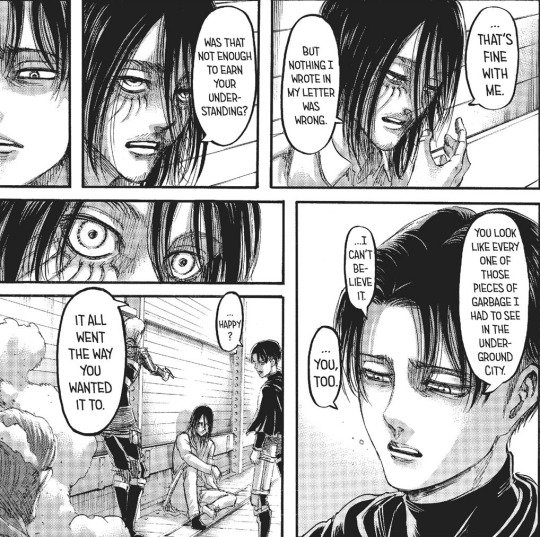
Levi is genuinely hurt. He doesn't like seeing Eren this way. He compares him to the pitiful people in the underground and laments, “You, too.” It’s another person that Levi has grown to care about who is simply “becoming a slave to something” and discarding parts of himself in order to accomplish his goal. Eren used to have so much fire and passion in his eyes and the blaze has started to burn out, replaced by something colder. Levi can tell there is something different about Eren now and it pains him.
Eren notices this.
Levi then expresses his distaste for the current situation toward Zeke, asking him if everything went the way he wanted it to. Zeke got what he wanted, and now Eren looks lifeless. Thanks, bud.
This leads me to my next point.
Levi seems to be exhibiting defensiveness about Eren

We haven’t had many interactions between Zeke and Levi just yet. However, all the banter aside, this panel gave us a huge clue that after Zeke mentions wanting to meet Eren, Levi’s glare seems to worsen, as Zeke makes note of it. While Levi can agree with Zeke that they don’t have all the time in the world, it also seems as though he’s not happy about Zeke pressing the issue of meeting up with Eren.
Levi has been asking Zeke the same things over and over while they’ve been waiting in the forest, trying to figure out the kind of person Zeke really is and whether he is being honest or not. Naturally, of course, he cares about the island as a whole, which is a huge contributing factor to this behavior. But I might be bold to suggest that he’s also trying to figure out what his next move is going to be regarding Eren and whether he’ll be able to protect him from Zeke if he’s truly a liar. This is, of course, just speculation on my part at this point.
The Forest and potential parallelism
The three of these characters are most likely going to reunite in the Forest of Giant Trees, where Eren once had to make a hard choice - the choice that he made that allowed his comrades to be killed.
Once again, a choice is probably going to have to be made here. Either Levi will try to persuade Eren to step back from Zeke, or Eren will have to convince Levi to work with them. While theoretically this could lead to a “fight,” I think at worst it would be a verbal altercation. Remember where they are. Levi and Zeke are in the forest specifically because titans have the disadvantage against the 3DMG here.
A few final points
Just as we don’t have Levi’s perspective, we’re kind of in the dark about Eren as of the current timeline as well. We still don’t know why he went to Marley or what he and Zeke discussed there. There’s also the chekov’s gun about him potentially being controlled by Zeke rather than acting of his own accord (Although I personally... am not a fan of this, but it’s possible and the story introduced the concept). This is the only thing that I can see being a physical danger to Levi, as I firmly believe Eren wouldn’t attack him normally. That being said, I do believe that Isayama is purposefully making us question Eren to throw the readers off.
The only thing Eren and Zeke want right now is just to get to each other because they are pressed for time. Eren is still determined to see whatever they’re planning through before Historia has to become a sacrifice. Eren’s goal has been stated over and over - he wants to protect the people he loves, not get them hurt and killed. I’m sure Levi feels similarly.
I feel like if anything, an “Eren vs. Zeke” showdown is something far more likely to happen. Especially if Zeke turns out to truly be “the bad guy” and takes actions that Eren knows will hurt his friends. That being said, it’s something that would happen later down the road rather than in the forest at the beginning of a new arc.
Anyway, all of the things above are why I’m certain we’re not going to see a “Levi vs. Eren” showdown happen in the forest. To me, it feels like it would be a waste of their character development and the importance their relationship has had on the story. Eren and Levi have been shown to acknowledge and care about each other. They have inspired each other and have given each other hope in many situations. I’d hate to see Isayama just throw that all out the window after all of the buildup. If anything, I feel that the buildup is leading to a moment where Levi will have to help bring the Eren we are familiar with back to the forefront if Eren’s childhood friends are unable to do it on their own.
#snk spoilers#snk meta#ereri#eren jaeger#levi ackerman#zeke jaeger#eren yeager#zeke yeager#mymeta#idek it's a lot of rambling
410 notes
·
View notes
Text
As the Story Goes...
[Part 2]
"A perfect score?" I whispered as I stared at the grade postings. Hundreds of students swarmed the board, locating their respective names. A few noticed my score and either clapped me on the shoulder or gave me scorching looks.
"What did I tell you?" The Messenger said.
"I hardly remember anything I wrote down..." I walked away from the board, face hardening.
"Something wrong Starshine?"
"I wanted to do it by myself." I murmured.
"Even the president needs help sometimes. Stop trying to be such a lone wolf."
I wrote two more midterms and handed in four assignments. The Messenger whispered the answers in my ear and told me how to write my essays. I focused on getting close with my professors and getting involved with school activities. Slowly, I became acclimated to the cheating. Eventually, I started to feel proud. Perfect scores on all of my work and not a single person could catch me.
I started to wonder if I could get away with murder.
It was only a hypothetical contemplation.
"I want you to do something for me." Said the Messenger one day. I was sitting in my dorm, reading.
"Like what?" Hopefully nothing dire or drastic.
"Nothing dire or drastic, Starshine, I promise. But I figured you owe me a small favor after everything I helped you with."
"Fair enough."
"I want to teach you how to use magic."
"... that's it?"
"Did you think I was going to make you assassinate someone?"
"Kind of."
"I know."
"So... magic? Thought it wasn't real."
"Really? You really want to tell me that? After everything?"
".... Fair. How do I go about... doing magic then?"
He chuckled, "It's easy."
First, he had me practice meditation. I thought it was a little cliché, much like the novels I read as a boy. He didn't say anything about that. I learned how to dismantle things, tear apart atoms and rearrange them into new things. He had me make teacups out of bed linens and paint out of tomato soup. It mesmerized me, the way my magic flashed and glimmered. He said I had the power of creation.
Then one day, into my post graduate studies, he told me to fill the kitchen sink with water.
"Put your head in it." He ordered, quietly.
"... Alright." I sucked in a large breath and submerged myself.
"Now breathe."
I obeyed, unable to do anything else.
I wrenched myself from the sink, coughing and spitting. Water dripped from my face onto the floor.
"Starshine, what was that?"
I continued to cough, "I did as you asked."
"No you didn't. I said breathe, not drown. Go back in again. And this time, try wrapping a hand around your mouth."
Water still burning my nose, I went under, carefully slipping a hand over my mouth and nose. Breathe, he said. I focused my magic, this time, arranging the water into oxygen.
I accidentally made all the water in the sink disappear.
A few tries later and I was able to transfigure only the water near my nose. With more practice, I didn't need to hold my hand to my face anymore.
A month passed before I mastered the technique.
Then the Messenger took me to space.
The first time, the vacuum nearly compressed my body into nothingness. I learned how to activate a simple shield spell before leaving Earth again. Translucent and blue, it encircled my body and kept a good amount of oxygen inside while protecting me from the lack of outside forces. I drew fuel for the spell from Earth, even while I floated above the atmosphere. I only lasted about five minutes before I became fatigued.
"What's the point of even trying?" I gasped, teleporting back to my small kitchenette.
"There's a favor I owe and I'm banking on you to do it for me."
"Why can't you do it?" I wrenched open the fridge and fisted my hand around a water bottle. I gulped the whole thing down.
"Because I taught you how to do magic so now you owe me something."
"No, you taught me magic because I owed you for helping me with my school work."
"Yeah... but I'm still helping you ace your classes and I'm still teaching you magic on top of that...But if you don't think you're up for it-"
I tore into an apple, "I never said that, ass hole. I'll go to space but it'd be nice if, in the future, you'd tell me what your ulterior motives are. I can do anything, thanks to you and this magic. You don't have to keep holding it against me." The core landed square in the trash bin, "I am yours and willing."
"If you must know, there's a powerful alien warlord in a neighboring galaxy. He needs my help - or yours, I suppose - to claim some lost territory."
Now the exercises had a purpose I could see to. I pushed myself and spent days in bed, passed out from exhaustion.
Finally, the day came.
"Are you ready?" He asked, as I stared down my portal. I patted my satchel, packed with two water bottles and minerals I stole from the chemistry labs. Finals were to start next week. My books remained on my shelf, dusty and useless.
"Of course." I wrapped a red scarf around my neck. Space tended to get cold.
"You won't need the shield today. The Zhaktari survive in a similar climate to yours so you'll be able to breath on their ship. When you arrive, introduce yourself as ‘Starshine’ and refer to Prince Vraxx as ‘his Lordship.’ He’ll love that."
I nodded, thankful I wouldn’t have to spend my energy on the shield. The portal swallowed me as I passed through it. Blinded for a few seconds, I appeared on Prince Vraxx's ship. I saw a beautiful array of galaxies spread out behind the transparent walls and ceiling. The floor was black and cooled my feet through my shoes. I inhaled - my lungs didn’t fill up all the way - and smelled the breezy scent of wet pine.
The sharp end of a spear suddenly pointed at my throat. I looked up the staff and saw the frowning jowls of a large, green, three-eyed alien. He dressed in gold armor, accented with imperial red. He could’ve snapped my spine with the click of his fingers.
He snarled something in a language I couldn't understand. I stared, wide-eyed and frozen. I didn’t think i could beat him - even with my magic.
"Relax, Starshine, Vraxxie's gonna get here. He speaks about two thousand languages. English has to be one of them."
A voice barked from somewhere behind the towering guard. Immediately, he turned and knealed. Prince Vraxx, in all his glory, stood with his nose in the air and his chest pushed out. He marched toward me. The jewels on his head gleamed, accenting his velvet cape and sleek armor. He shot me a look with his large, beady eye and I knelt instantly.
The Messenger chuckled.
The prince said something and the guard stood up and left. With my head bowed, I didn't see where he went.
"Stand up." He ordered. I obeyed. "Who are you?"
"S-Starshine. My name is Starshine...your Lordship."
He grinned, "He finally paid his debt. The fucker. Come, Starshine, you have work to do." He turned and I followed him to the front of the ship. There were no walls or separate rooms. Only a very conspicuous opening in the floor. It probably lead to some private quarters. I felt light headed by the time we reached the controls. I slipped my hand over my mouth and drew upon the water in my satchel for air.
"Something the matter?"
"The air is a bit thin."
"Poor thing, your system isn't optimized like ours. So wasteful." He called to one of the shipmates and sent them away somewhere. "She's getting you a helmet."
"Thank you but it'd unnecessary."
"You're here to do work for me. Important work. I want you functioning properly, as you should. Even if your magic is strong enough."
I wondered how he knew about my abilities.
The helmet was black and simple, like a motorcycle helmet. I put it on, relieved to see that it worked. Then Vraxx put me to work. He showed me the enemy formations and I told him where and how to attack. I was thankful I took the History of War class back in boarding school. Earth military strategy looked very different from whatever they were doing in space. I spent well over a day on that ship before the prince seemed satisfied. I helped him take most of the territory back. He felt confident enough to do the rest of it on his own.
"You'll have to teleport directly out of the ship. I have to keep the magic shields up, so we're not hit by surprise. But once you reach the star of Yenveir Roden, you'll be able to teleport home. The helmet should operate outside the ship, too. And I'll give you some garments that'll protect you from the vacuum of space." Vraxx explained, winding down the last simulation. He gave me a suit of armor similar to the ones the guards wore. It was smaller, to accommodate my size, and sleeker. A shallow hole sat in the chest plate. It nestled a hollow glass ball. I wrapped my scarf around my neck, over the armor.
"Mage armor. It's nearly obsolete, considering we now train our mages to be warriors. The sphere in your chest is meant to house excess magic, either if you want to store some for later or if you just have too much of it."
"Thank you, your Lordship."
"You're welcome. It was a pleasure working with you. I wish you a safe journey home."
I flashed out of the ship. Using my magic, I propelled myself forward, towards Yenveir Roden.
"Starshine... prepare to draw up a shield. Something might be coming at you."
"We cleared out the immediate are, though." I mentally rehearsed the steps.
"Yeah but there's still one ship. Set the shield so it absorbs the energy. It'll protect you from the blast better."
"OK." I amended the spell. Anxiously, I kept floating towards the star.
"You'll want to turn around and draw it up now, Starshine."
I stopped and did as he told me. Not a second passed before a shower of acid green sparks exploded against the shield. The impact pulsed light blue across the otherwise translucent surface. My heart pulsed faster. Two more beams collided with my shield.
"Do you smell that?"
I took a deep sniff, "It smells like... Wet pine."
"Enhance it with your magic."
"... wet pine and... and burning rubber, eugh. What is that?"
"Magic has a signature. It's different across all mages. There's the primary signature, something soothing, usually. The strength of the primary smell depends on the strength of the mage. And the secondary signature, a complementary and acrid smell. It's strength depends on the intent of the action."
"Interesting. You know, Vraxx's ship smelled like wet pine- oh. Ohhh... he shot me!"
"Yeah he did. And you're going to do something about it."
"But I’m not able to take down even one of his guards! How-"
"Just listen to me, you'll be fine."
"... Alright. How do we do this?"
On the Messenger’s instruction, I absorbed the shield and the power from the three blasts. I flew over to Yenveir Roden and took whatever power I could from it. I rearranged the photons into pure energy. My body vibrated with all the power it held. I manifested a small ball of bright blue energy and willed it to grow. It grew to be twice the size of Yenveir Roden. I cleared my mind and refocused. Swiftly, I launched the bright ball of magic in the direction of his ship, knowing it would hit, even if i couldn’t see it.
A moment passed.
An explosion lit up the surrounding space for a brief minute. I watched an escape pod - coloured red and gold - eject itself from the reaction. My heart beat rapidly in my chest and I fought to catch my breath, the adrenaline wearing down and my body tiring. I opened a portal, tumbled through it and collapsed in a heap on my kitchen floor.
I passed out and slept through my first exam.
5 notes
·
View notes
Text
Your Ultimate Women-Write-The-Best-of-Everything 2019 Reading List
The Voyeurs (Graphic Novel)
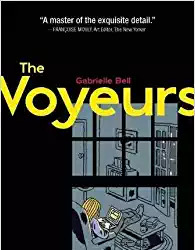
"The Voyeurs is the work of a mature writer, if not one of the most sincere voices of her literary generation. It's a fun, honest read that spans continents, relationships and life decisions. I loved it."—Chris Ware, Acme Novelty Library
"As she watches other people living life, and watches herself watching them, Bell's pen becomes a kind of laser, first illuminating the surface distractions of the world, then scorching them away to reveal a deeper reality that is almost too painful and too beautiful to bear."— Alison Bechdel, Fun Home
"A master of the exquisite detail, Bell provides a welcome peephole into our lives."—Françoise Mouly, The New Yorker
The Voyeurs, was named one of the best books of the year by Publishers Weekly, Kirkus Reviews, and the Atlantic.
Behind the Beautiful Forevers: Life, Death, and Hope in a Mumbai Undercity

In this brilliant, breathtaking book by Pulitzer Prize winner Katherine Boo, a bewildering age of global change and inequality is made human through the dramatic story of families striving toward a better life in Annawadi, a makeshift settlement in the shadow of luxury hotels near the Mumbai airport. As India starts to prosper, the residents of Annawadi are electric with hope. Abdul, an enterprising teenager, sees “a fortune beyond counting” in the recyclable garbage that richer people throw away. Meanwhile Asha, a woman of formidable ambition, has identified a shadier route to the middle class. With a little luck, her beautiful daughter, Annawadi’s “most-everything girl,” might become its first female college graduate.
Marbles: Mania, Depression, Michelangelo, and Me: A Graphic Memoir
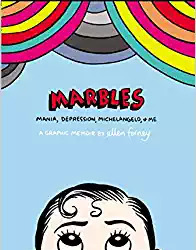
Cartoonist Ellen Forney explores the relationship between “crazy” and “creative” in this graphic memoir of her bipolar disorder, woven with stories of famous bipolar artists and writers.
Shortly before her thirtieth birthday, Forney was diagnosed with bipolar disorder. Flagrantly manic and terrified that medications would cause her to lose creativity, she began a years-long struggle to find mental stability while retaining her passions and creativity.
Searching to make sense of the popular concept of the crazy artist, she finds inspiration from the lives and work of other artists and writers who suffered from mood disorders, including Vincent van Gogh, Georgia O’Keeffe, William Styron, and Sylvia Plath. She also researches the clinical aspects of bipolar disorder, including the strengths and limitations of various treatments and medications, and what studies tell us about the conundrum of attempting to “cure” an otherwise brilliant mind.
Darkly funny and intensely personal, Forney’s memoir provides a visceral glimpse into the effects of a mood disorder on an artist’s work, as she shares her own story through bold black-and-white images and evocative prose.
The Woman in Cabin 10
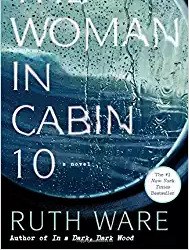
From New York Times bestselling author of the “twisty-mystery” (Vulture) novel In a Dark, Dark Wood, comes The Woman in Cabin 10, an equally suspenseful and haunting novel from Ruth Ware—this time, set at sea.
In this tightly wound, enthralling story reminiscent of Agatha Christie’s works, Lo Blacklock, a journalist who writes for a travel magazine, has just been given the assignment of a lifetime: a week on a luxury cruise with only a handful of cabins. The sky is clear, the waters calm, and the veneered, select guests jovial as the exclusive cruise ship, the Aurora, begins her voyage in the picturesque North Sea. At first, Lo’s stay is nothing but pleasant: the cabins are plush, the dinner parties are sparkling, and the guests are elegant. But as the week wears on, frigid winds whip the deck, gray skies fall, and Lo witnesses what she can only describe as a dark and terrifying nightmare: a woman being thrown overboard. The problem? All passengers remain accounted for—and so, the ship sails on as if nothing has happened, despite Lo’s desperate attempts to convey that something (or someone) has gone terribly, terribly wrong…
1222
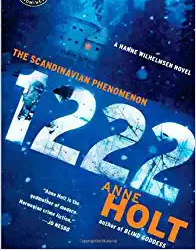
Nominated for the Edgar Award for Best Novel, from Norway’s #1 bestselling female crime writer—a “beguiling” (The Washington Post) “good old-fashioned murder mystery” (The New York Times Book Review) set in an isolated hotel where guests stranded during a monumental snowstorm begin turning up dead.
A train on its way to the northern reaches of Norway derails during a massive blizzard, 1,222 meters above sea level. The passengers head for a nearby hotel, centuries old and practically empty. With plenty of food and shelter from the storm, the evacuees think they are safe, until one of them turns up dead.
With no sign of rescue and the storm raging, retired police inspector Hanne Wilhelmsen is asked to investigate. Paralyzed by a bullet lodged in her spine, Hanne has no desire to get involved. But when another body turns up, panic takes over. Complicating things is the presence of a mysterious guest, a passenger who traveled in a private rail car and now stays secluded on the top floor of the hotel. No one knows who the guest is, or why armed guards are needed. Hanne has her suspicions. Trapped in her wheelchair, trapped by the storm, and now trapped with a killer, Hanne knows she must act before the killer strikes again.
Robot Dreams
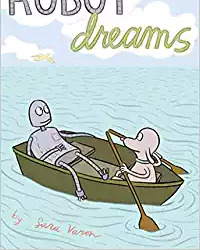
A Kirkus Reviews Best Book of the Year
A PW Best Book of the Year
An ALSC Notable Children’s Book
A YALSA Great Graphic Novel
This moving, charming graphic novel about a dog and a robot shows us in poignant detail how powerful and fragile relationships are.
Borderlands / La Frontera: The New Mestiza

Rooted in Gloria Anzaldúa's experience as a Chicana, a lesbian, an activist, and a writer, the essays and poems in this volume profoundly challenged, and continue to challenge, how we think about identity. Borderlands / La Frontera remaps our understanding of what a "border" is, presenting it not as a simple divide between here and there, us and them, but as a psychic, social, and cultural terrain that we inhabit, and that inhabits all of us.
Hyperbole and a Half: Unfortunate Situations, Flawed Coping Mechanisms, Mayhem, and Other Things That Happened
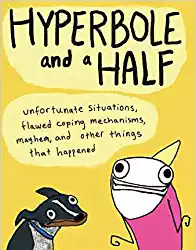
Every time Allie Brosh posts something new on her hugely popular blog Hyperbole and a Half the internet rejoices.
This full-color, beautifully illustrated edition features more than fifty percent new content, with ten never-before-seen essays and one wholly revised and expanded piece as well as classics from the website like, “The God of Cake,” “Dogs Don’t Understand Basic Concepts Like Moving,” and her astonishing, “Adventures in Depression,” and “Depression Part Two,” which have been hailed as some of the most insightful meditations on the disease ever written.
Salt, Fat, Acid, Heat: Mastering the Elements of Good Cooking

Now a Netflix series!
New York Times Bestseller and Winner of the 2018 James Beard Award for Best General Cookbook and multiple ICAP Cookbook Awards
Named one of the Best Books of 2017 by: NPR, BuzzFeed, The Atlantic, The Washington Post, Chicago Tribune, Rachel Ray Every Day, San Francisco Chronicle, Vice Munchies, Elle.com, Glamour, Eater, Newsday, Minneapolis Star Tribune, The Seattle Times, Tampa Bay Times, Tasting Table, Modern Farmer, Publishers Weekly, and more.
A visionary new master class in cooking that distills decades of professional experience into just four simple elements, from the woman declared “America’s next great cooking teacher” by Alice Waters.
Monstress Volume 1: Awakening
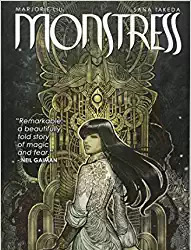
Set in an alternate matriarchal 1900's Asia, in a richly imagined world of art deco-inflected steam punk, MONSTRESS tells the story of a teenage girl who is struggling to survive the trauma of war, and who shares a mysterious psychic link with a monster of tremendous power, a connection that will transform them both and make them the target of both human and otherworldly powers.
About the Creators:
New York Times bestselling and award-winning writer Marjorie Liu is best known for her fiction and comic books. She teaches comic book writing at MIT, and leads a class on Popular Fiction at the Voices of Our Nation (VONA) workshop.
Persepolis
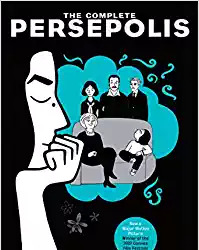
Marjane Satrapi's best-selling, internationally acclaimed graphic memoir.
Persepolis is the story of Satrapi's unforgettable childhood and coming of age within a large and loving family in Tehran during the Islamic Revolution; of the contradictions between private life and public life in a country plagued by political upheaval.
Nobody Nowhere: The Remarkable Autobiography of an Autistic Girl
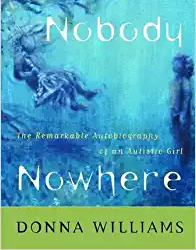
Donna Williams was a child with more labels than a jam-jar: deaf, wild disturbed, stupid insane... She lived within herself, her own world her foreground, ours a background she only visited. Isolated from her self and from the outside world, Donna was, in her words, a Nobody Nowhere. She swung violently between these two worlds, battling to join our world and, simultaneously, to keep it out. Abandoned from all connection to the self within her, she lived as a ghost with a body, a patchwork of the images which bombarded her. Intact but detached from the seemingly incomprehensible world around her, she lived in what she called 'a world under glass`.
After twenty-five years of being misunderstood, and unable to understand herself, Donna stumbled upon the word 'autism': a label, but one which held up a mirror and made sense of her life and struggles, and gave her a chance to finally forgive both herself and those around her.
The Ice Princess
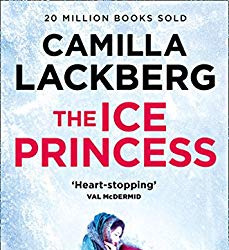
The psychological thriller debut of No.1 bestselling Swedish crime sensation Camilla Lackberg.
A small town can hide many secrets
Returning to her hometown after the funeral of her parents, writer Erica Falck finds a community on the brink of tragedy. The death of her childhood friend, Alex, is just the beginning. Her wrists slashed, her body frozen in an ice-cold bath, it seems like she’s taken her own life.
Meanwhile, local detective Patrik Hedström is following his own suspicions about the case. It’s only when they start working together that the truth begins to emerge about a small town with a deeply disturbing past…
The Vampire Chronicles: Interview with a Vampire, The Vampire Lestat, and The Queen of the Damned

In 1976, nearly 80 years after Bram Stoker published Dracula, Anne Rice's bestselling first novel, Interview with the Vampire, breathed new life into the vampire myth. Now, in one chilling volume, here are the first three classic novels of The Vampire Chronicles; Interview with the Vampire, The Vampire Lestat, and Queen of the Damned.
Adulthood is a Myth: A Sarah's Scribbles Collection
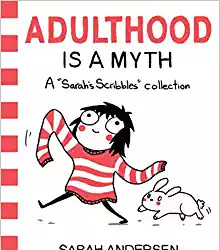
Do you love networking to advance your career? Is adulthood an exciting new challenge for which you feel fully prepared? Ugh. Please go away.
2016 GOODREADS CHOICE AWARD WINNER FOR GRAPHIC NOVELS AND COMICS!
These casually drawn, perfectly on-point comics by the hugely popular young Brooklyn-based artist Sarah Andersen are for the rest of us. They document the wasting of entire beautiful weekends on the internet, the unbearable agony of holding hands on the street with a gorgeous guy, and dreaming all day of getting home and back into pajamas. In other words, the horrors and awkwardnesses of young modern life. Oh and they are totally not autobiographical. At all.
Nimona
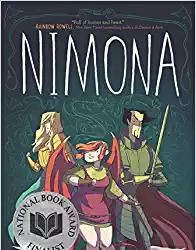
Indies Choice Book of the Year * National Book Award Finalist * New York Times Bestseller * New York Times Notable Book * Kirkus Best Book * School Library Journal Best Book * Publishers Weekly Best Book * NPR Best Book * New York Public Library Best Book * Chicago Public Library Best Book
The New York Times bestselling graphic novel sensation from Noelle Stevenson, based on her beloved and critically acclaimed web comic. Kirkus says, “If you’re going to read one graphic novel this year, make it this one.”
Nemeses! Dragons! Science! Symbolism! All these and more await in this brilliantly subversive, sharply irreverent epic from Noelle Stevenson. Featuring an exclusive epilogue not seen in the web comic, along with bonus conceptual sketches and revised pages throughout, this gorgeous full-color graphic novel has been hailed by critics and fans alike as the arrival of a “superstar” talent (NPR.org).
Cultural Anthropology Barbara Miller

Cultural Anthropology presents a balanced introduction to the world’s cultures, focusing on how they interact and change. Author Barbara Miller provides many points where readers can interact with the material, and encourages students to think critically about other cultures as well as their own. Featuring the latest research and statistics throughout, the eighth edition has been updated with contemporary examples of anthropology in action, addressing recent newsworthy events such as the Ebola epidemic.
Captain Marvel Volume 1: Higher, Further, Faster, More
Kelly Sue Deconnick
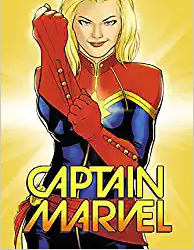
Hero! Pilot! Avenger! Captain Marvel, Earth's Mightiest Hero with an attitude to match, is back and launching headfirst into an all-new ongoing adventure! As Captain Marvel, a.k.a. Carol Danvers, comes to a crossroads with a new life and new romance, she makes a dramatic decision that will alter the course of her life - and the entire Marvel Universe - in the months to come. But as Carol takes on a mission to return an alien girl to her homeworld, she lands in the middle of an uprising against the Galactic Alliance! Investigating the forced resettlement of Rocket Girl's people, Carol discovers that she has a history with the man behind the plot. But when the bad guy tries to blackmail Carol and turn the Avengers against her, it's payback time! Guest-starring the Guardians of the Galaxy!
6 notes
·
View notes
Text
WU Reviews: Best of 2018
2018 is finally at an end! For many, this has been a rough year, but the world kept turning and there were still incredible books, movies, TV shows, etc. to indulge in. Below is a compilation of what our Wellesley siblings enjoyed this year - the Best of 2018 that can entertain you as we head into 2019. Happy New Year!

Title: How to Write an Autobiographical Novel by Alexander Chee
Type: Book
Recommended by: E.B. Bartels ‘10
Why? This essay collection is phenomenal. It is a must read for all aspiring writers, but much like Anne Lamott's Bird by Bird, Chee's essays give great advice for writing AND for life. Also, his essay about 9/11 made me cry. It's SO GOOD.
Title: Good and Mad
Type: Book
Recommended by: Wendy Wellesley ‘22
Why? Inspiring account of the power of mobilization towards a cause.
Title: Bob’s Burgers
Type: TV
Recommended by: E.B. Bartels ‘10
Why? Now in its 9th season, I swear Bob's Burgers has only gotten better and funnier. I love watching this show because it just makes me HAPPY, which often during 2018 I sometimes really needed. The characters make me laugh, the puns are incredible, and I always feel better after watching an episode.
Title: The Proposal by Jasmine Guillory
Type: Book
Recommended by: Alexandra Stark ‘10 (and massively seconded by Shloka Ananthanarayanan ‘08!)
Why? Jasmine is a Wellesley alum! But more importantly this book is a lovely, realistic (ish--it's still romance after all) portrayal of an inter-racial relationship with consent and all of that good stuff.
Title: The Friend by Sigrid Nunez
Type: Book
Recommended by: E.B. Bartels ‘10
Why?
I read The Friend this fall on a tip from, well, a friend, and I am obsessed. Nunez writes about loving literature and working as a writer and how to deal with grief/death and what it means to be a good friend, all through a moving and engaging story about a woman who inherits her friend's dog after he dies suddenly. Read it! The National Book Award doesn't lie!
Title: An American Marriage by Tayari Jones
Type: Book
Recommended by: Shelly Anand ‘08
Why? It’s such a critical topic in our society, the mass incarceration of black men , but it discusses this terrible phenomenon from such a personal perspective, the inner workings of a relationship and marriage. Its beautifully written, deeply moving, and you find yourself rooting for multiple characters that are at times in conflict with one another. It’s a must read for 2018!
Title: GLOW
Type: TV
Recommended by: E.B. Bartels ‘10 (and again, seconded by Shloka Ananthanarayanan ‘08!)
Why? Oh my god GLOW IS INCREDIBLE. 80s fashion and glitter and queer love stories and so many strong badass women and an awesome soundtrack. Just watch it. The second season came out in June and made me have so many feelings. I loved it.
Title: Widows
Type: Movie
Recommended by: Cleo ‘09 (and by Shloka Ananthanarayanan ‘08!)
Why? Steve McQueen's 2018 heist drama (based on a 1983 British series) stars an all-star cast including Viola Davis, Michelle Rodriguez, Cynthia Erivo, Liam Neeson, Colin Farrell and Daniel Kaluuya. The story centers on female heroines dealing with the aftermath of their spouses' poor choices while simultaneously trying to survive and adjust to their new solo 'normals.' A key twist toward the end keeps the viewer on their toes without being gimmicky and the ending was highly satisfying. TW for violence.
Title: How To Be a Good Creature by Sy Montgomery
Type: Book
Recommended by: E.B. Bartels ‘10
Why? This is a magical book. If you felt disenchanted with how your fellow humans acted in 2018, do what Sy Montgomery did and turn to animals. She writes about thirteen non-human creatures that changed her life in some way and the life lessons she learned from them. It's so good!!! My 85 year old grandfather also loved it!
Title: How to Invent Everything by Ryan North
Type: Book
Recommended by: Laura Staffaroni ‘10
Why? A great mirror universe survivalist book--instead of teaching you how to survive in a dystopic future, post-civilization collapse, you get to learn how to survive in the distant past, pre-civilization! Hilarious and informative.
Title: Won’t You Be My Neighbor?
Type: Movie
Recommended by: E.B. Bartels ‘10 (and Shloka Ananthanarayanan ‘08, AGAIN)
Why? I wept through this entire Mr. Rogers documentary. It's incredible.
2 notes
·
View notes